THE YAGANAGI FAMILY OF BANGALORE
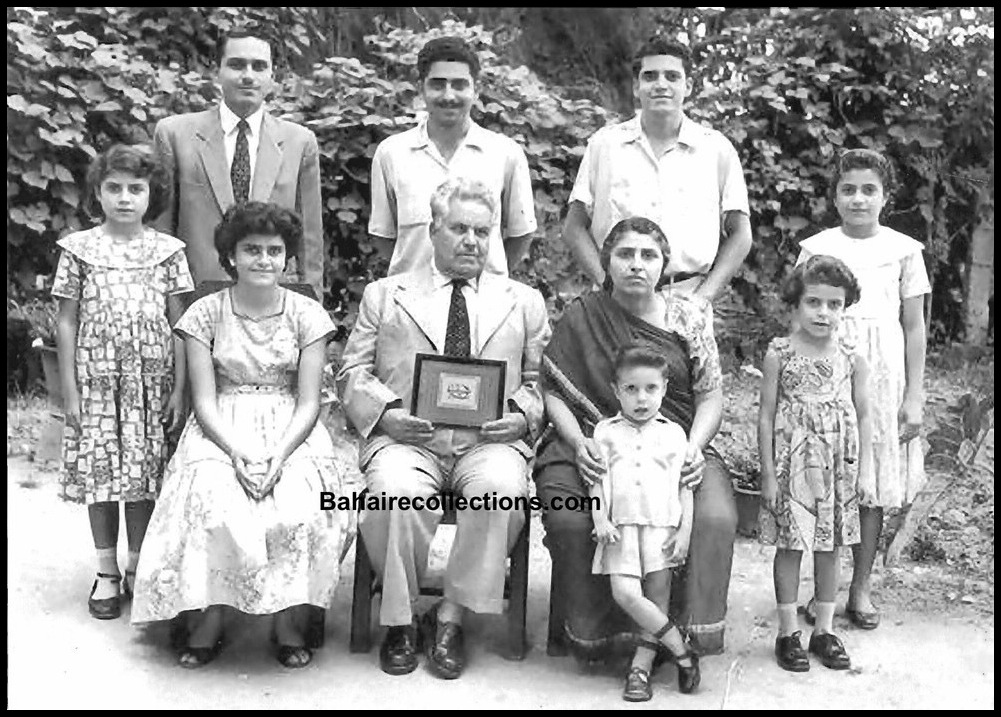
THE YAGANAGI FAMILY
This story is to pay tribute to my parents who were the first pioneers to South India and established the first Local Spiritual Assembly in Bangalore City. They persevered at their post for nearly half a century and came to be regarded as the spiritual parents of that region. The eight children of this couple too arose to pioneer to several parts of the world at some point in their lives and are therefore known as a family of pioneers. This is a humble effort to present some of the salient services that my parents rendered at a time when the Faith was taking root in South India.
My Father Soroosh Forood Yaganagi
My father, Soroosh Forood Yaganagi, affectionately known as “Aghajan”, was born into a Zoroastrian family in the village of Ghasemabad in the province of Yazd in Iran on 14 February 1902. His father was Forood, and mother Mehrbano. He had an older sister, Golbano, and an older brother, Isfandiar. He left Iran when he was 17 years old to go to India for business reasons.
Arriving in Bombay in about 1919, my father went to Poona (Pune) to join his father or my grandfather, Forood Shariar, and his older brother or my uncle, Isfandiar Forood, who was ten years older than him. Both my grandfather and uncle had come to India from Iran a few years earlier. My grandfather never helped his two sons while in Pune. It was my uncle Isfandiar who took care of my father when he first arrived in Pune by giving him a job in his small restaurant.
My father and uncle Isfandiar complemented each other, so their business partnership was a happy and prosperous one. Both brothers shared an intense love for each other throughout their lives. After a short time of working together, my father moved on and worked with a person who owned a toddy business. Toddy is a sap obtained from a palm tree which was fermented to produce an alcoholic beverage. Both brothers collected enough money in a couple of years to jointly own the Yazdani Restaurant in Pune.
BIRTH OF THE YAGANAGI FAMILY
It needs to be mentioned that the last names of my father and my uncle Isfandiar were originally “Forood”, which was their father’s first name. In the early 1930s, government officials from all Iranian consulates ordered that all Iranians could not keep their father’s first name as their last name. With that directive, all Iranians had to get a new last name. The name Farood was then dropped. This was around the time when my father and his brother had become Bahá’ís. So, they decided to take the last name “Yaganagi”, which in Farsi means “Unity”. Unity being the basic tenet of the Bahá’í Faith, and it fit very well in this new life’s journey that they were going to undertake.
SEEKING THE PROMISED ONE
In Iran, the followers of Islam gave the Zoroastrians a very hard time by insulting them, spitting on their faces, and throwing junk into their yards. But my father and uncle waited for the advent of the World Savior, the S̲h̲áh-Bahram, as promised in the sacred books of the Zoroastrian Faith. While in Iran, they had heard about the Bahá’í Faith. But what they had heard was all kinds of false accusations and rumors about the Bahá’ís. They had intense hatred towards the Bahá’ís. For this reason, they did not go into serious investigation of the Bahá’í Faith.
There was a storekeeper in Poona by the name of Zainal Abidin Mahalati whose family was from a Zoroastrian background. But they did not know that Zainal Abidin was a Bahá’í. He was a regular customer at the Yazdani Restaurant in Pune, which was jointly owned by my father and uncle. When Zainal Abidin saw that both brothers were keen on learning Farsi from him, he came to the Yazdani Restaurant from 2:00 pm to 3:00 pm every weekday. These classes were held in a room in the Yazdani Restaurant. Zainal Abidin read to them from the Mathnawi, written by Jalāl al-Dīn Muḥammad Rūmī, the renowned mystic poet of Persia, and passages from the Holy Quran, in which references were made to the return of a Messenger of God. Zainal Abidin would go to his store in the market after classes and return at 6:00 pm to say goodbye for the day before returning to his home.
My father recounted this story on numerous occasions of how both brothers became Bahá’ís. He said that he and his brother had been searching for over seven years for The S̲h̲áh-Bahram. They both had strong feelings that the Promised Savior had already appeared, but did not know where to find Him.
My father mentioned that when they went to the Fire Temple in Pune, where the priests would burn ordinary wood rather than the sandalwood they took there. On questing that, my father and uncle were excommunicated from the Zoroastrian Faith and were not allowed to enter the Fire Temple ever again. This led them to search for the promised S̲h̲áh-Bahram elsewhere. My uncle Isfandiar showed his daughter Monira a tree in a park in Pune under which my father, and he would always sit and weep and beg God to help them find the Promised S̲h̲áh-Bahram.
One night, my uncle had a dream that he would find out about the World Savior the next day. My father also had an amazing experience the same night. He saw a bright light flooding his whole room in a room in the restaurant in which he lived. At first, he thought it came from some very brilliant object from the sky. He looked outside and saw that there was no light except the light from the moon and the twinkling stars. Yet surprisingly, his whole room was flooded with this bright light. He looked everywhere but could not figure out where this bright light was coming from. He finally got exhausted and went to sleep. When he went back to sleep, he dreamed that there were two fish swimming in muddy water, and then suddenly they were swimming out into crystal clear water. In the morning, when he went into the front of the restaurant, he wondered why the furniture and other items in the room were moved around! He knew that no one had broken into the restaurant or his room.
My uncle mentioned his strong feelings about the imminent appearance of the World Savior to my father, and said, “God willing, we both will know the truth today.”
Now, both the brothers were very excited and were anxiously waiting for 2:00 pm. Zainal Abidin arrived punctually at 2:00 pm as he always did. They went to the room to study Farsi. When he read the Mathnavi, Zainal Abidin would explain it to them very well. But he evaded some other verses. On that day, he read a passage saying that “a person had slept for 1,000 years and when he woke up he wanted to use the coins from his pocket, but the police stopped him and asked him from where he got those coins. He answered that these coins are not recent… they were from a long time ago.” When they asked him what this verse meant, Zainal Abidin told them they would find the meaning on their own. It was 3:00 pm and Zainal Abidin got up and left.
As usual, he came back at 6:00 pm to say goodbye on the way to his home. The brothers paid off the carriage driver and told him to leave but retained Zainal Abidin. They were not going to let Zainal Abidin walk away without telling them who this World Savior was. The brothers took a knife into the room and locked the door. They insisted that he tell them the meaning of the verse or else he was not going to leave the room alive. Their insistence was based on the strong feeling my uncle had on the return of the S̲h̲áh-Bahrám and the dream my father had the previous day. Their teacher realized that he could no longer hold the truth from them! Zainal Abidin was reluctant to tell them that Bahá’u’lláh was the Promised One, the Universal Messenger of God, The S̲h̲áh-Bahrám, for today, because these two brothers had not accepted the Bahá’í Faith when they had heard about it in Iran. But now he told them that the Universal Messenger of God for today was “Bahá’u’lláh”, the prophet founder of the Bahá’í Faith, and indicated to them that the S̲h̲áh-Bahram had already come. As soon as Zainal Abidin gave this answer, they fell to the ground in shock and shame, and even fainted. When they became conscious, they were so sad and wept bitterly with shame for not having investigated the Bahá’í Faith when they were in Iran. Both immediately accepted Bahá’u’lláh and became Bahá’ís.
Now, when their father heard that they had become Bahá’ís, he became very angry. He went to the Yazdani Restaurant and threw all the money from the cash register and other things onto the street. He shouted that they were going to hell for having left their Zoroastrian Faith to become Bahá’ís. He told the passers-by to take all the things that he had thrown on the street as they belonged to “Kaffirs” or non-believers.
My Mother Firoozeh Bidenjeri Yaganagi
My mother, Firoozeh, was born February 14, 1919, in the village of Maryamabad, in Yazd, Iran. Her father was Mehraban and mother Gowhar. After her mother passed away, her father married Kharman. My mother came to India when she was 14 years old with her father Mehraban Bidenjeri, and younger brother Keikhosrow for medical reasons. She lived with a very kind Parsee family in Bombay for 2 years. Her father had accepted the Bahá’í Faith before leaving Iran.
My mother had to follow the rituals of the Zoroastrian Faith when she lived with the family in Bombay, but secretly said her Bahá’í prayers. She had learned these prayers from her Bahá’í neighbor in Iran when they met at the public well to get water together. There was also a Bahá’í family on the same floor in the building in Bombay and the children shared with her each week what they had studied at the Bahá’í children’s classes. My parents got married on 21 April 1935, which was the first Bahá’í marriage in Pune.
PIONEERING TO BANGALORE
The beloved Guardian, Shoghi Effendi, asked believers to move to other parts of India under the Six-Year Plan. That letter was read at the Nineteen-Day Feast in Pune, in which the Guardian urged the Iranian Bahá’ís especially to go pioneering and not get saturated in Pune and Bombay. My parents, who were touched by this call, moved out of Pune to Bangalore city in Karnataka State with their three sons – Anayat, Farrage and Faiz. They became the first Bahá’í pioneers of South India. They arrived in Bangalore on October 1, 1941.
The Guardian was very pleased with my parents. A letter written on his behalf to the National Spiritual Assembly of India, dated 27 December 1941, reads, “He read with great interest the report of the progress of the teaching work in Kashmir, as well as the wonderful news of the departure of Mr. Yaganagi and family in Bangalore…”
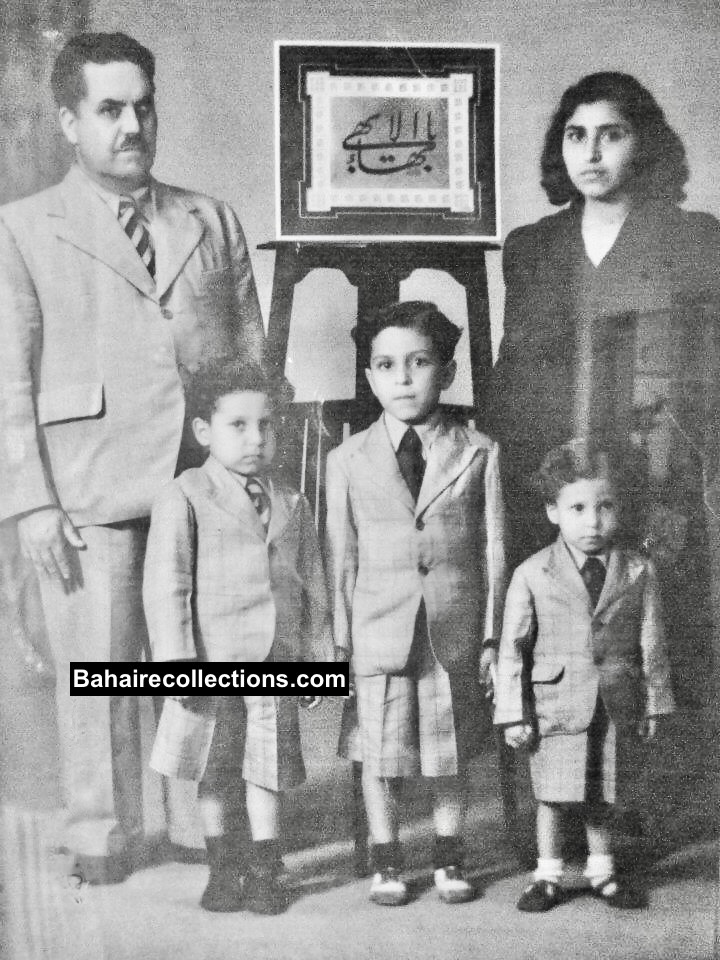
A 1942 photo in Bangalore. My father, and my mother Firoozeh at the back with my brothers L- R: Farrage, Anayat, and Faiz.
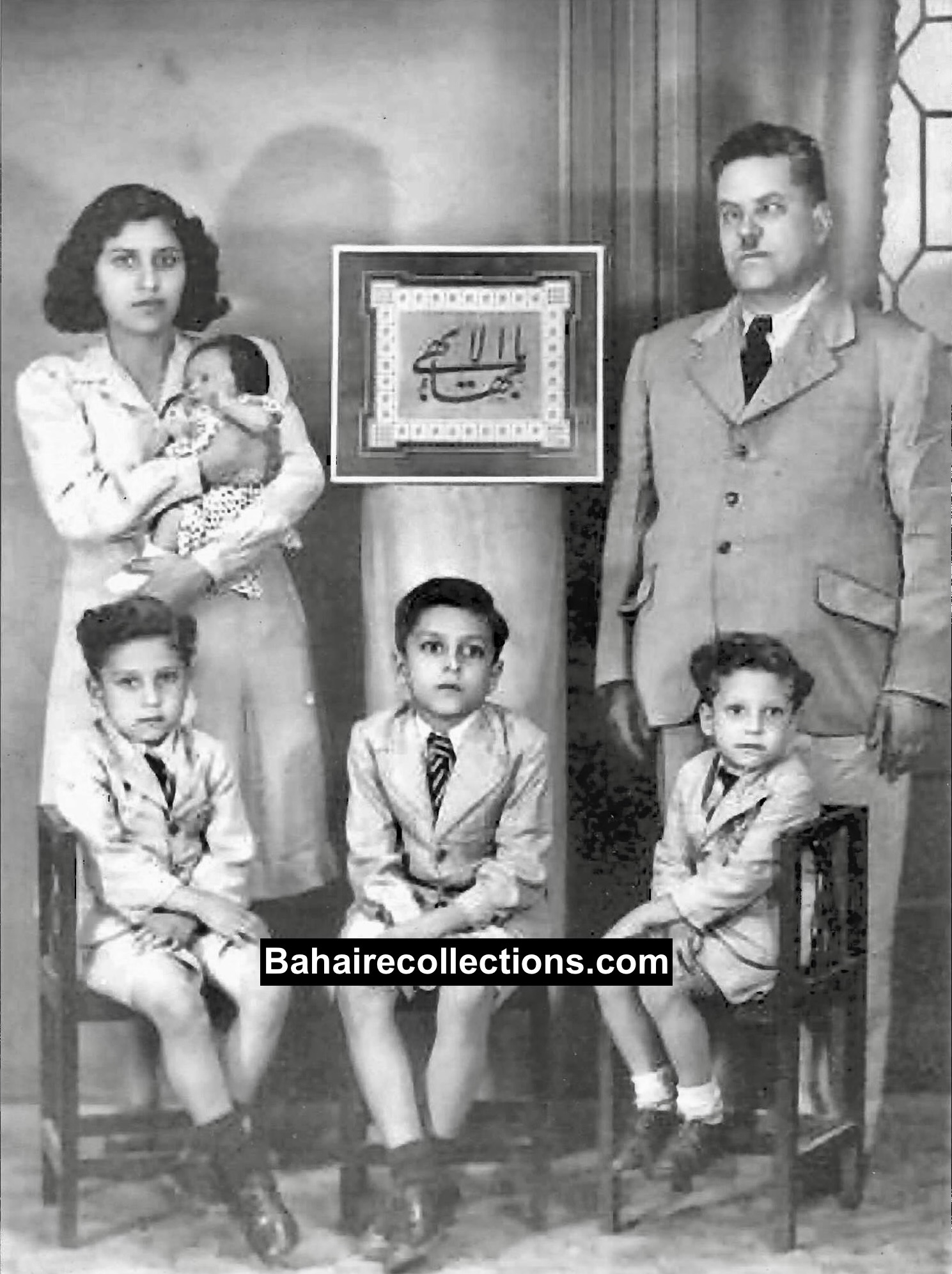
A 1944 photo in Bangalore. Standing L-R: My mother Firoozeh carrying Tuba, My father Soroosh Yaganagi. Sitting L to R: my brothers Farrage, Anayat and Faiz.
In Bangalore, my father owned the Mubarak Hotel, which was opposite the Russell Market. The Mubarak Hotel was popularly known as a Bahá’í restaurant.
FIRST SPIRITUAL ASSEMBLY
As soon as they landed in Bangalore, it was not easy to find a good house, as the World War was still in progress. They established their residence in a few places in Bangalore. They initially lived in a small house in the Sindhi Colony and then wanted to move into a bigger house so that it could serve the needs of the Faith. So, they moved to a house on Palm Road in Frazer Town. This residence on Palm Road was also the Bahá’í Centre for Bangalore. The beloved Guardian had sent my father a letter to tell him to establish the first Local Spiritual Assembly of the Bahá’ís of Bangalore by April 21, 1942. At the time of receiving the letter there were only two Bahá’ís in Bangalore — my parents. Since it was a directive from the Guardian, my father lost no time in achieving the goal set for him. My parents had brought along some Bahá’í pamphlets and books from Pune, and they used them to teach the local people.
One day my father was walking along the Palm Road with some pamphlets in his pocket with the desire of teaching the Faith. At that time, he could not speak any of the South Indian languages. He spoke Farsi, Urdu and very little English. As he saw a room with people having a meeting, he knocked on the door and went in. With the little English that my father knew, he introduced himself and informed them about the Bahá’í Faith and gave them some pamphlets. That group was called the “Round Table Group” in Bangalore, whose members were the elite in the city. They were doctors, lawyers, and members of the Lion’s Club, the Rotary Club, The Bangalore Club, The Bowring Club, and a few others. They met regularly in this rented room on Palm Road to discuss affairs of the Bangalore community. My father joined the Round Table Group and invited them to meet at the Bahá’í Center so they could save on rent. They accepted his offer. Five members of the Round Table Group and my parents’ neighbor, Dr. Blazie accepted the Faith. Anayat and Farrage started school at Clarence High School, and my parents hired Mrs. O’ Doherty to be their tutor. After her tutoring sessions, my father gave her the books he brought from Pune for her to read and explain the contents to my parents in her broken Urdu. Eventually, she declared her faith in Bahá’u’lláh. With that, nine had come into the Faith. As soon as nine people had embraced the Faith, the first Local Spiritual Assembly of the Bahá’ís of Bangalore was established by the end of 1941 through joint declaration.
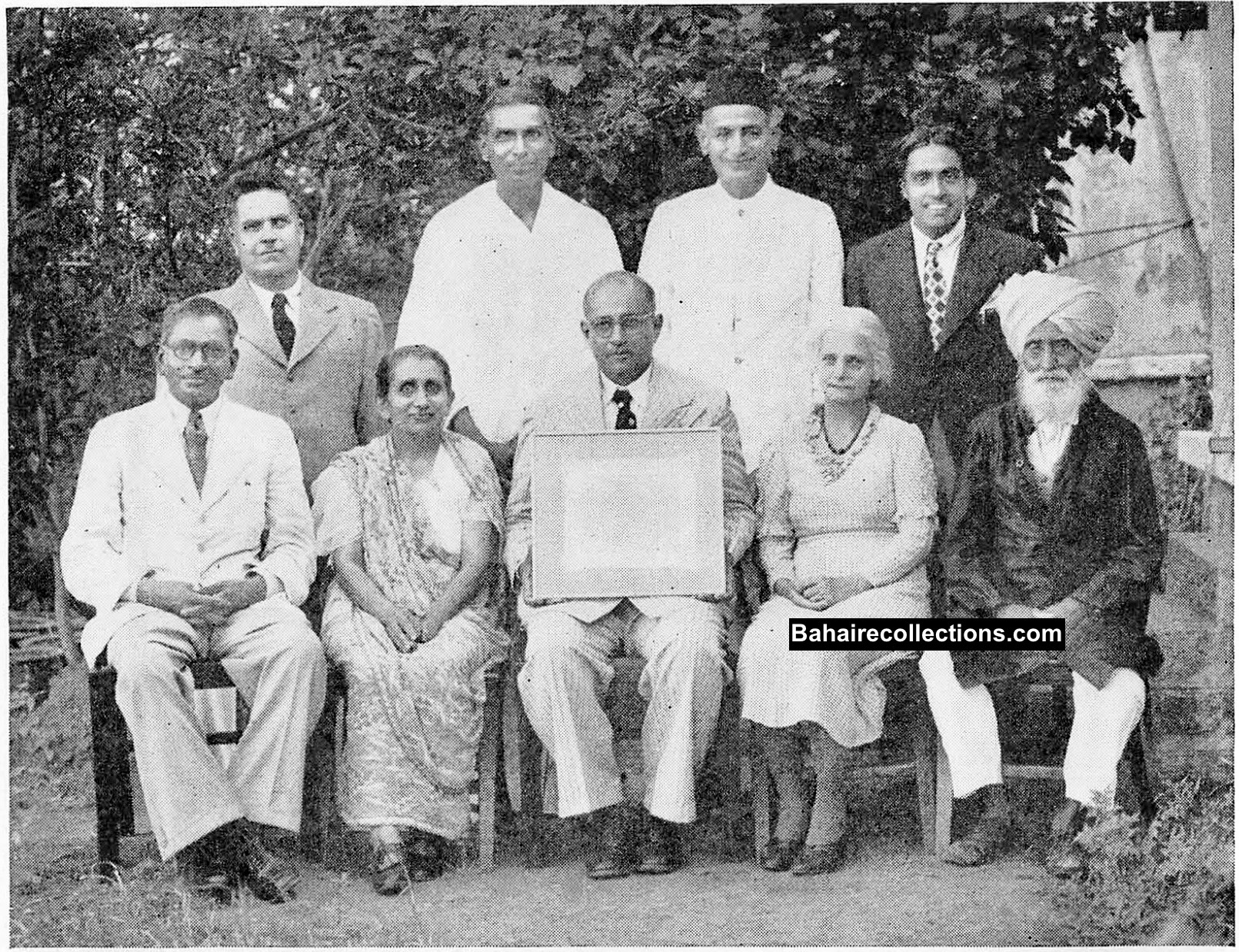
The Local Spiritual Assembly of Bangalore, 1942. Sitting L-R: unknown , Mrs. Sethna, Mr. Gowdy, Ms. O’Doherty, unknown. Standing L-R: my father Soroosh, Hussein, Mr. Swami Wahal, Dr. Ganpaya
The success of my father in establishing the Faith in Bangalore was mentioned in a cable from the Guardian to the believers of India. This cable and the success of my father encouraged many young families to leave their homes and settle in other virgin territories of India.
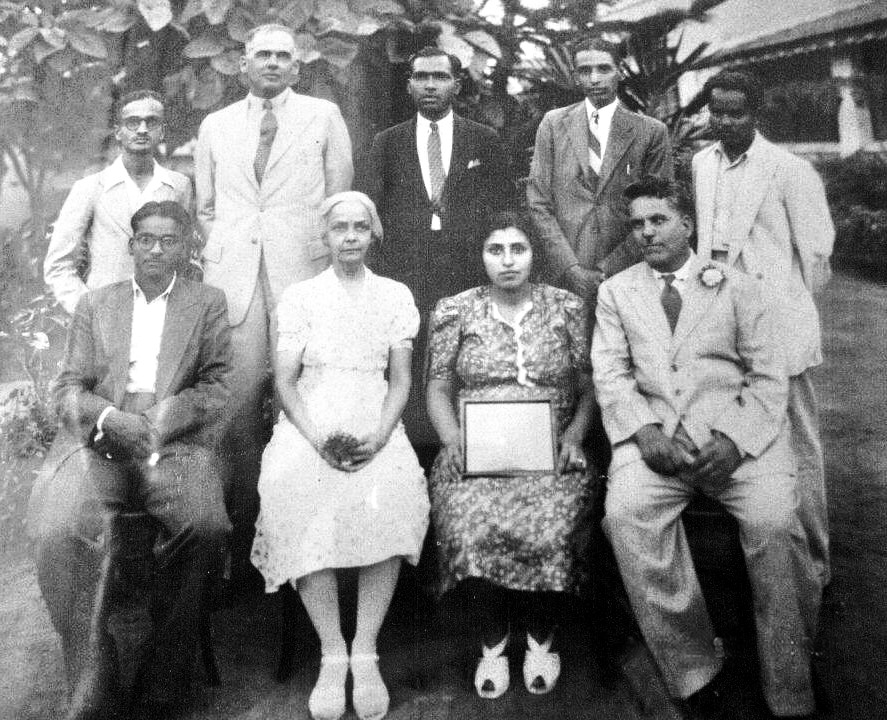
The Local Spiritual Assembly of Bangalore, circa 1953. Sitting L-R: Unknown, Ms. O’Doherty, my mother Firoozeh and my father Soroosh. Standing L-R: Hussain, Gowdi, unknown, Dr. Ganpaya, unknown.
Mr. ‘Abdu’lláh Fáḍil, a young Bahá’í from Persia, was sent by the National Spiritual Assembly of India and Burma to South India to help the communities there. He arrived in Bangalore and helped with teaching the Bahá’í Faith. Fáḍil and my father would go to clubs in Bangalore. Fáḍil was excellent at bringing the Faith to those in the Round Table Group. They held weekly meetings and discussed religious subjects. Fáḍil and my father went to these meetings and explained the subjects under discussion in light of the Divine Teachings. They gave many speeches at the Lion’s Club and Rotary Club. The Bahá’ís became active members of many clubs: The Lion’s Club, The Rotary Club, the Bowring Club, The Round Table Group of Fraser Town, and many other groups.
The Round Table Group studied Bahá’í books at the Palm Road Centre. He put up the Bahá’í Centre signboard on top of the gate. After many years of residing at the Bahá’í Center on Palm Road, my parents bought a farm called Tuba Palace in Sait Palayam, in February 1946, which is in the suburbs of Bangalore. My parents loved the property because their roots were in farming when they lived in Iran, and they loved the farm and immediately bought it. They named it Tuba Palace in honor of our sister Tuba, who was born a couple of years before they acquired this property.
Even after moving out of the Palm Road house, it continued to be used as a Bahá’í Center. Tuba Palace became the epicentre of a lot of activities for the Faith. This is where my other sisters Qudsiah, Nazanin, and my brother Attapur and I were born.
My parents participated in the Intercontinental conference held in New Delhi in 1953 where they met hundreds of believers from various parts of India and abroad. They were thrilled to meet several Hands of the Cause of God who were present, and gathered their signatures on the back of the group photo that was taken at the conference.
Translation and printing Bahá’í books
My father was in constant communication with the Guardian to find out what to do next. One of the tasks the Guardian gave my father was getting the translation of the book “Bahá’u’lláh and the New Era” and prayer books from English into the Kannada, Telugu, and the Tamil languages. Mr. Swami, one of the early believers of Bangalore, would help him get the books printed in Vellore in the neighboring Tamil Nadu state. Mr. Swami owned the Modern Electrical Store on Commercial Street in Bangalore. They both dressed very elegantly, always with suits and hats, because the British had a great influence in Bangalore.
The Guardian had asked my father to send 10 copies of the Tamil translation of the book Bahá’u’lláh and the New Era to the Bahá’ís of Malaya, which was to become Malaysia in 1963. The Guardian had told him to send those copies immediately on arrival from the printers. He made many trips to Madras city (Chennai) in Tamil Nadu until the book was translated by one Mr. “Konaarpattu” Sethuraman and printed in Vellore. He got the books from the printers, and immediately packed 10 copies to be mailed to Malaya. However, when he reached the post office they were closing down for lunch. He told the postal workers how important it was for the books to be mailed immediately. They helped him with his request, and he treated all of them to lunch. My father had sent some copies to the Guardian who placed them in the Mansion of Bahjī in ‘Akká.
The book was popularly in demand in Malaya. The Kuala Lumpur Assembly had written to the Bahá’í Publishing Trust of India in 1960 placing an order for this book. One day Mr. Vasudevan, a Malaysian pioneer to India in 1967, mentioned how the teaching work in Malaysia transformed when they received the 10 copies of the Tamil translation of the book Bahá’u’lláh and the New Era. My father was very happy to hear that.
MASS TEACHING
My parents taught the Bahá’í Faith with great vigor. Around 1959, a Local Spiritual Assembly was established in the twin villages of Sait Palayam and Karianpalya. That was one assembly for both those villages. The first to accept the Faith in Karianpalya was Professor Lakshminarayan, who taught photography at the Polytechnic College in Bangalore. There was great interest in teaching the Faith in the surrounding villages. So, he and our father accompanied each other on teaching trips to our surrounding villages. We siblings used to accompany them on some days.
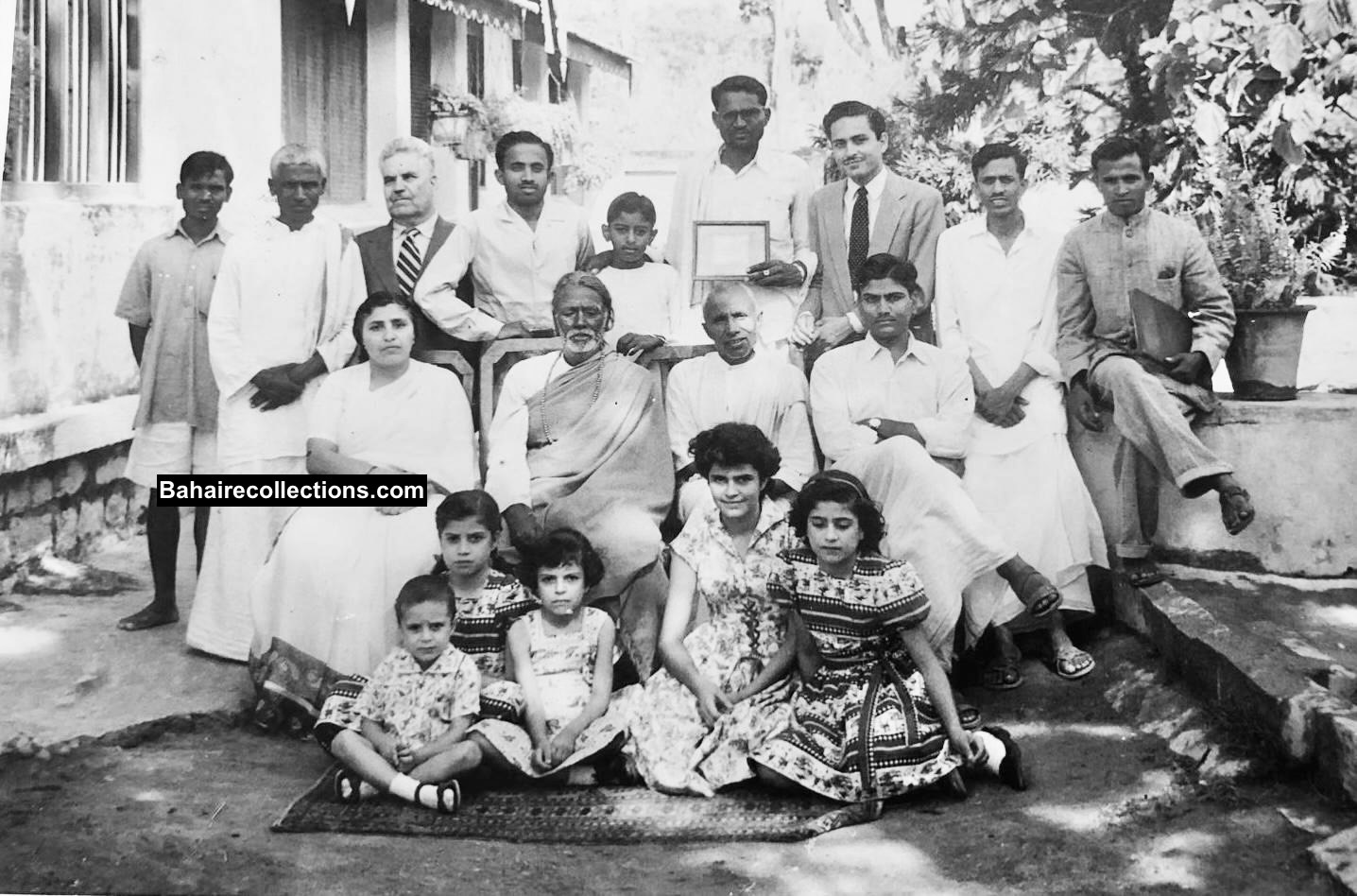
A 1958 photo. Eight members of the Local Spiritual Assembly of Saitpalayam and Karianpalya with other believers at Tuba Palace. The ninth member of the Assembly not in the photo is Lakshminarayan who took the photo. Sitting on the carpet L-R: Attapur, Missaghiah, Nazanin, Tuba, Qudsiah. L-R: Sitting: My mother Firoozeh, Swami, Pillappa Patel, Lakshmipathy. Standing L-R: unknown, Chowdappa, my father Soroosh, Krishna Patel, Krishnappa, Anayat,unknown, unknown.
One day, Lakshminarayan and my father decided to go to the neighboring village of Kacharakanahalli, about a mile away from Tuba Palace in Bangalore. When they reached the bridge near Mr. Munshi’s farm, they sat on the bridge and recited some prayers. Munshi was the owner of the farm next to us. He and his son built aeronautical parts. Their farm and Tuba Palace were separated by a stream. There was a bridge over the stream. There was a bench on it, where we would sit and look at the lake across it. As they were praying, one Mr. Chowdappa came to them and started a conversation. He was from Hennur Village, which was about 3 1⁄2 miles away. They told him about the Bahá’í Faith. He was very interested and invited them to Hennur. They went to Hennur the following Sunday, and this was the start of mass teaching in Bangalore. Since most of the people living in villages were illiterate, they could not sign their names on the Bahá’í Declaration cards. But they affixed their thumbprints, as official signatures, on their declaration cards. The headman in Hennur too accepted the Faith, and in Ridván 1959, the new Local Spiritual Assembly was elected.
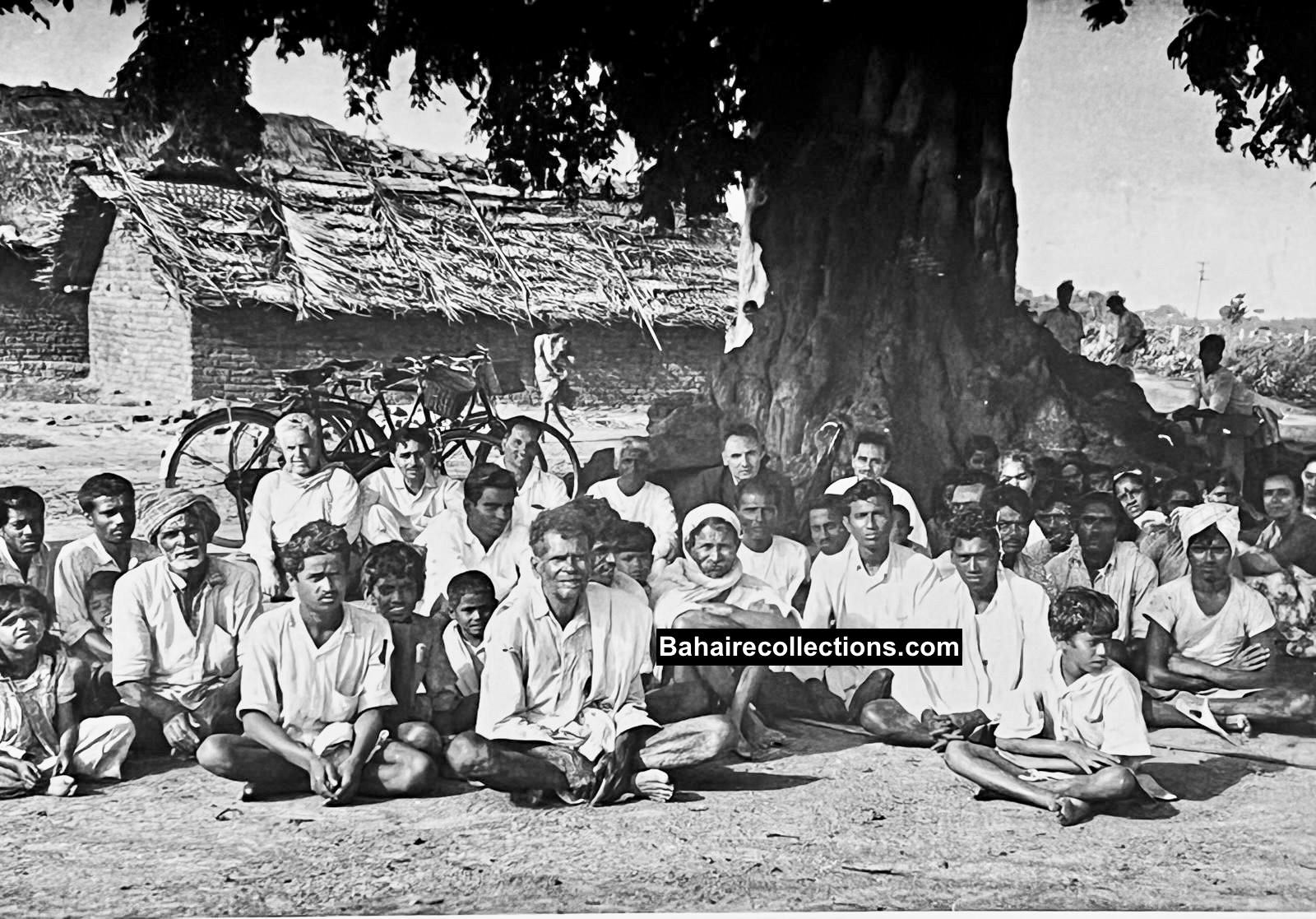
Visit to Hennur Village, early 1969. Hand of the Cause of God Dr. Muhájir is seated in the middle of the back row, attired in black. My father Soroosh is seated at the extreme left in the back row.
As a result of mass teaching, by the early 1960s the Faith was established in the villages surrounding Tuba Palace. They then went to Hoodi which was close to the old airport where Prof. Lakshminarayan’s sister resided. The Faith expanded in this part of Bangalore immensely. My parents, Lakshminarayan, Chowdappa, the family of Mr. Vittal, Gurupad, Vijayarangam, Sambandam and his wife, and many other friends visited the villages regularly, and many Local Spiritual Assemblies were established. Mass Teaching of the Bahá’í Faith gained momentum, and many people in the towns and villages around Bangalore accepted the Faith.
We, the Yaganagi children, Mr. Vittal’s daughters Kalaivani and Vanita, Lakshminarayan’s sons Mohan, Chander, and Srinivas, and other children went on regular teaching trips on the weekends. The family of Vittal spoke the Tamil language as well. They helped by inviting the people to the meetings that were held under trees, or at the village temples. We, the Yaganagi children, invited children from Sait Palayam and Karianpalya to attend the children’s classes which were held at Tuba Palace.
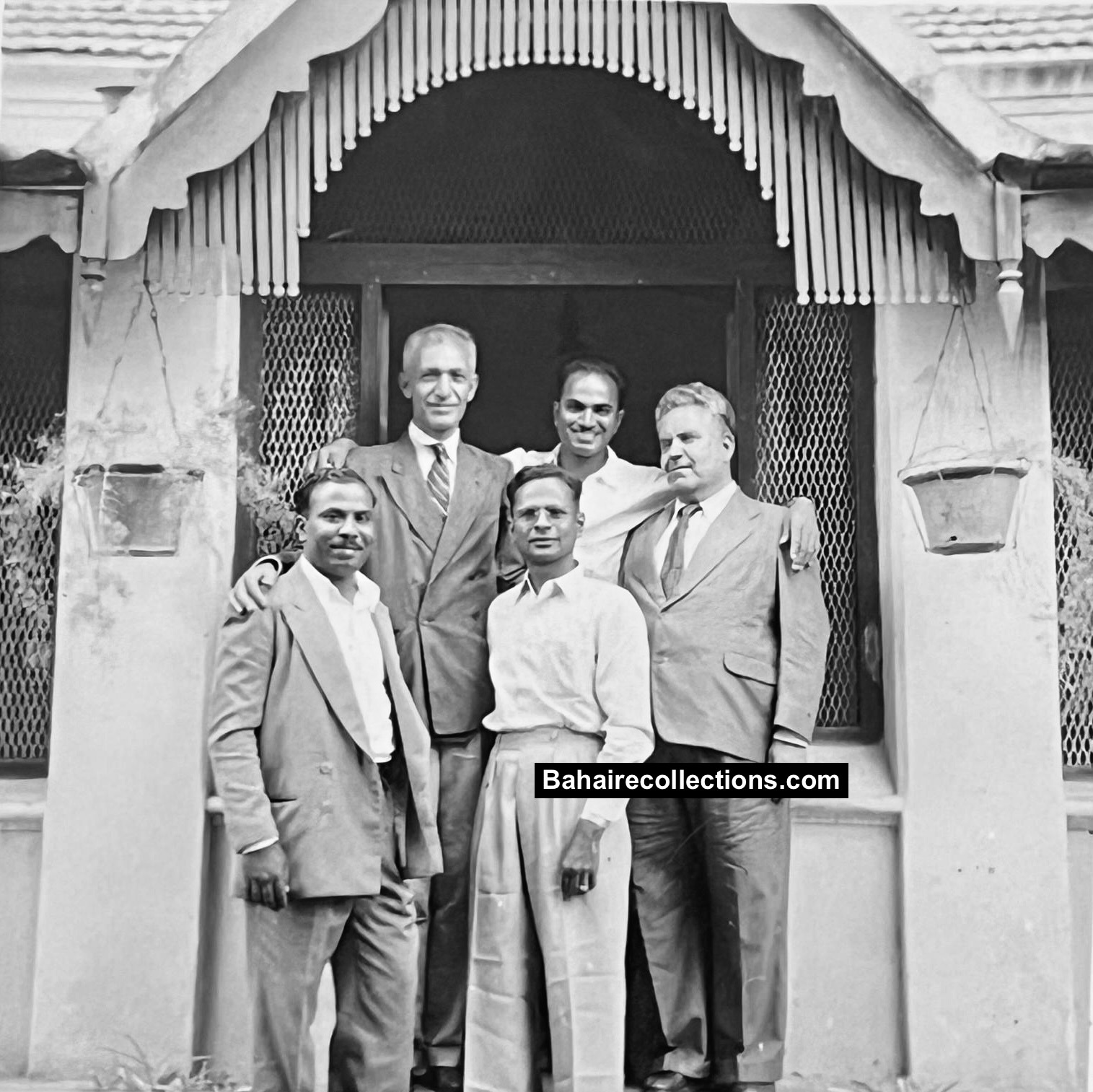
At Tuba Palace, circa 1960. Front row L-R: Mr. Gurupadand Mr. Vijayarangam. Back row L-R: Mr. Mobedzadeh, Mr. S. S. Mani, my father Soroosh
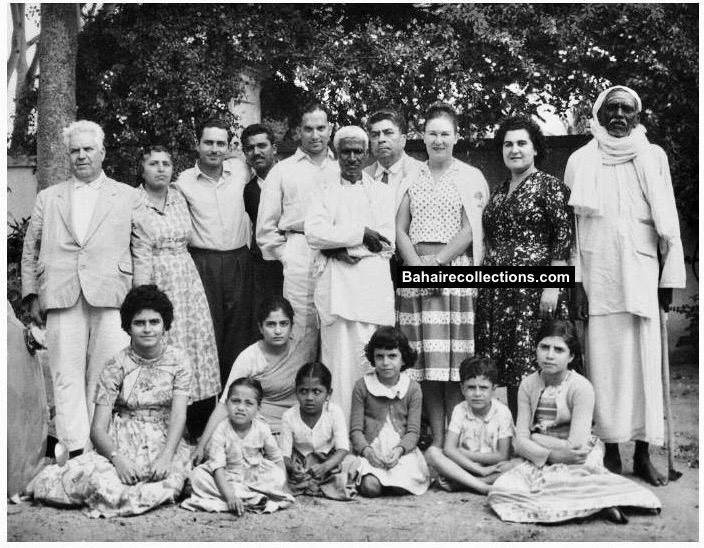
Tuba palace, 1960. Sitting L-R: Tuba Yaganagi, Kalavathy, Qudsiah Yaganagi, Manila, Nazanin Yaganagi, Attapur Yaganagi, Missaghiah Yaganagi. Standing L – R: my father Soroosh, my mother Firoozeh, Anayat Yaganagi, unknown, Raja Vittal, Choudappa, Bahram Ayadi, Ms. Buckle, Simin Ayadi, Swami Muniswami.
It was during this time that the Local Spiritual Assembly of Bangalore was gifted with a jeep to assist with teaching the Faith. Mr. Bahram Ayadi drove the jeep to Bangalore and was the driver for a few months together with his nephew Jehangir Rastenehad, until Mr. Ratnam was hired. My mother learned to drive the jeep so she could travel long distances to go to neighboring villages to teach the Bahá’í Faith. We would sometimes go with her. The teaching zeal in us was the product of my parents involving us in field teaching from the beginning.
Most of these teaching trips that my parents took happened in the evenings. My father would pick up Lakshminarayan from the Polytechnic College in the jeep, and they would go teaching. They usually returned around midnight. Ratnam never complained that it was late. He declared his faith in Bahá’u’lláh. On some nights my mother would relieve Ratnam. Ratnam was a great mechanic, so we paid very little for fixing the jeep whenever it broke down. Most of the villages did not have electricity, so they took a lantern with them. They also took pamphlets translated from English into Kannada, Tamil, and Telugu, languages spoken in the vicinity of Bangalore. They had ink pads and Bahá’í declaration cards. Since most of the people in the villages were illiterate, their thumbprints were affixed as a legal way of signing the Bahá’í Declaration cards.
AMATU’L-BAHÁ VISITS BANGALORE
In 1964, Amatu’l-Bahá Rúhíyyih Khánum and Mrs. Violette Nakhjavani visited Bangalore. Rúhíyyih Khánum wanted to open a new village for the Bahá’í Faith. It was decided by the Area Teaching Committee to take her to Kadagrahara village. It was in this village that Rúhíyyih Khánum mentioned that she had never signed the Bahá’í Declaration card and would like to do so. During the days of mass teaching, those friends who became Bahá’ís signed their names on a form and affixed their thumbprints. Rúhíyyih Khánum too signed her name and also affixed her thumbprint on a Bahá’í Declaration card. Violette Nakhjavani has mentioned this in her book “Amatu’l-Bahá Visits India”. This document was immediately sent to the National Spiritual Assembly of India. When they were on their way to the village in the late evening, it was very dark and the jeep they were riding in got stuck in the mud. All of them got out and pushed the jeep out and reached the village. Since the villagers were informed about Rúhíyyih Khánum and Violette Nakhjavani’s visit, they had already assembled at the local temple. Rúhíyyih Khánum laid the cornerstone for the Bahá’í Center for Kadagrahara that night. A Bahá’í Center was later built on that site. On their return from the village, all the friends were served dinner at Tuba Palace. A group picture was taken with Rúhíyyih Khánum and Violette Nakhjavani. While she was in Bangalore, she was happy to see mass teaching taking place with great success. She also laid the cornerstone for the Bahá’í Center of Saitpalayam and Karianpalya. The plot of land was donated by the headman of the village, Pillappa Patel. A beautiful Bahá’í Center was built on that plot and was used for various activities in Karianapalya.
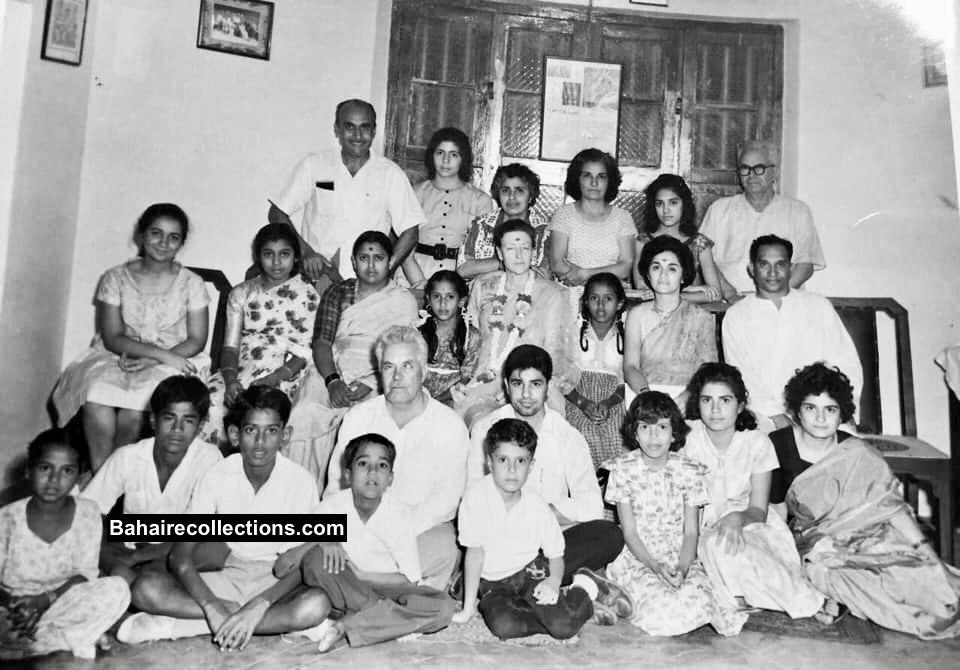
Amatu’l-Bahá meets the community at Tuba Palace. Back row L to R: Mr. Lakshminaryan, 3rd my mother Firoozeh, 4th Rezwan Mobedzadeh, 6th Isfandiar Yaganagi. On the chairs: L to R: 3rd Mrs. Lakshminaryan, Chitra Lakshminaryan, Amatu’l-Bahá, Vijayalakshshmi Lakshminarayan, Violette Nakhjavani, Raja Vittal. On the floor L to R: 3rd Srinivas Lakshminarayan, 4th my father Soroosh, Jehangir Rastinehad, Attapur Yaganagi, Nazanin Yaganagi, Missaghiah Yaganagi, Qudsiah Yaganagi.
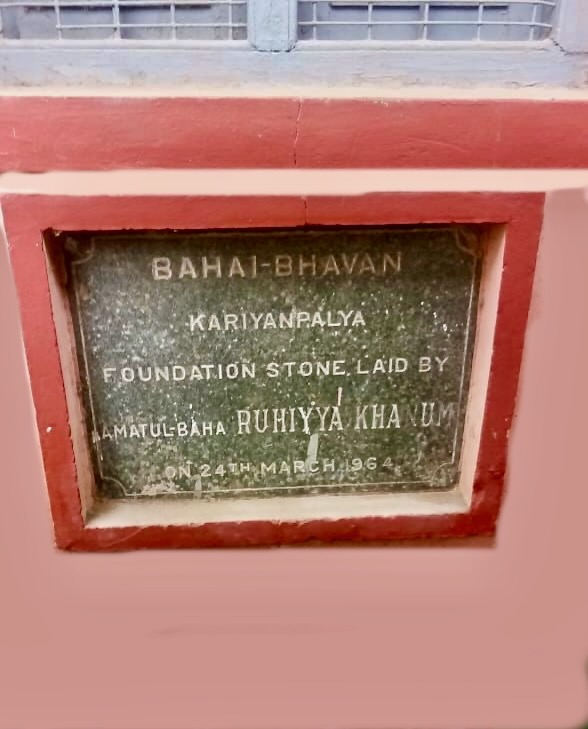
Foundation stone that Amatu’l-Bahá Rúhíyyih Khánum laid for the Bahá’í Center of Karianpalya
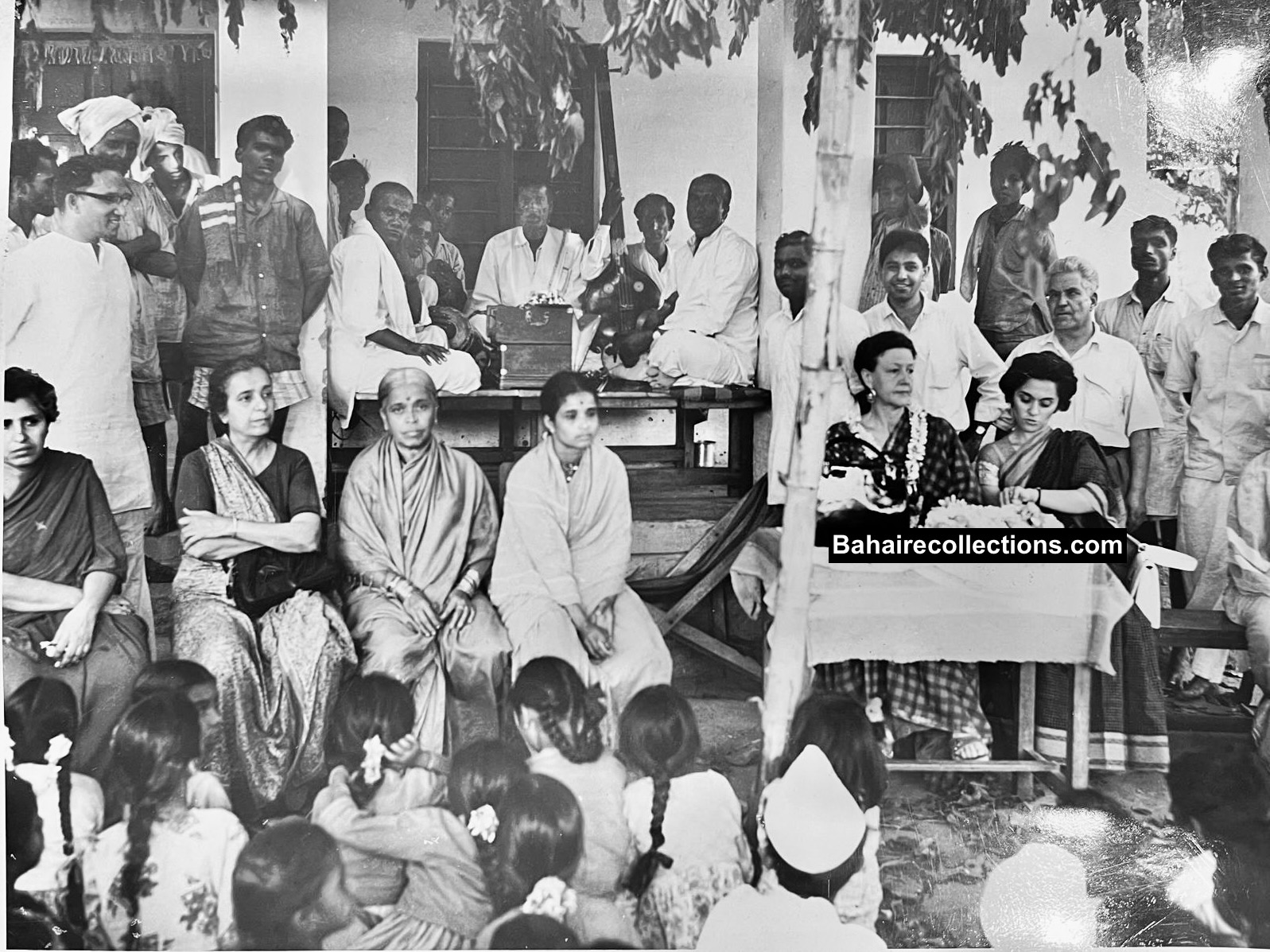
A 1964 photo with Amatu’l-Bahá Rúhíyyih Khánum in Karianapalya, after laying the foundation stone for the Bahá’í Center of Karianpalya. Sitting L to R : My mother Firoozeh and Mrs. Shirin Boman. Standing behind my mother is Raja Vittal. At the table L-R: Amatu’l-Bahá Rúhíyyih Khánum and Mrs. Violette Nakhjavani. Behind Mrs. Nakhjavani is my father Soroosh.
VISITS BY OTHER HANDS OF THE CAUSE
During these years of intense mass teaching of the Faith, many Hands of the Cause visited Bangalore, and the Yaganagi Family had the bounty of hosting them. Dr. Raḥmatu’lláh Muhájir visited on numerous occasions and was a beacon of light to all. Other Hands of the Cause that visited were Mr. Horace Holley, Mr. Tarázu’lláh Samandarí, Mr. Jalál Kházeh, Mr. Enoch Olinga and his wife Elizabeth, Mr. Paul Haney, Mr. ʻAlí-Akbar Furútan, Mr. Adelbert Mühlschlegel and his wife Ursula Kohler, Mr. Collis Featherstone and his wife Madge Featherstone. Mr. Jalál Kházeh had stayed for one month during his visit. Hand of the Cause Mr. Tarázu’lláh Samandarí was also a calligrapher, and he made many pictures of the Greatest Name when he stayed for one and half months. He also presented the Yaganagi family with one which they had framed and placed in the Hall Room. Many of the Hands of the Cause who resided at Tuba Palace joined the family in daily devotions.
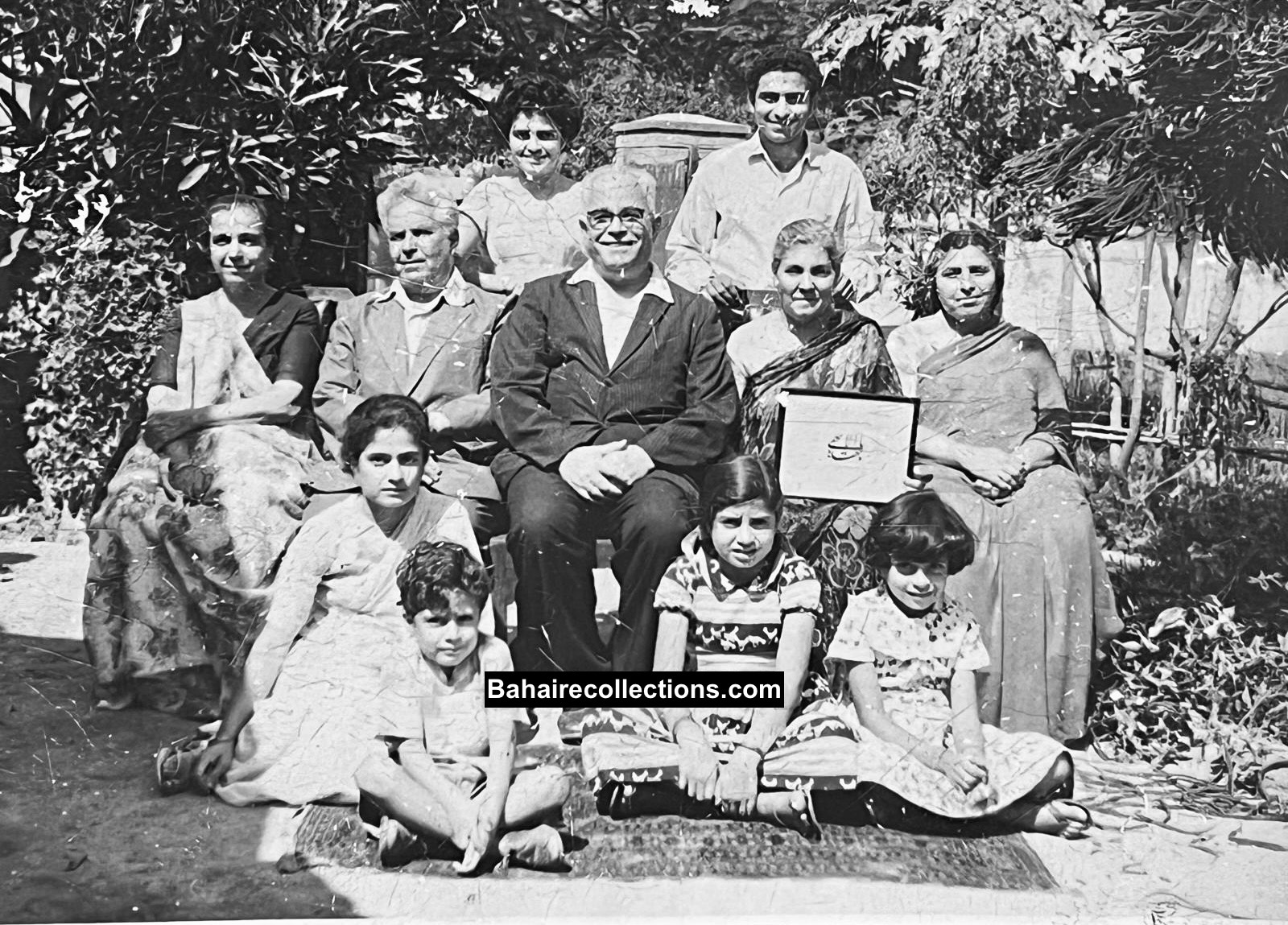
A 1960 photo. On the floor L-R Qudsiah, Attapur, Missaghiah and Nazanin. Sitting on the chair L-R: Mrs. Shirin Boman, my father Soroosh, Hand of the Cause of God Mr. Jalál Kházeh, Keshwar Yaganagi (my uncle Isfandiar’s wife), and my mother Firoozeh. Back row L-R: Tuba and Farrage
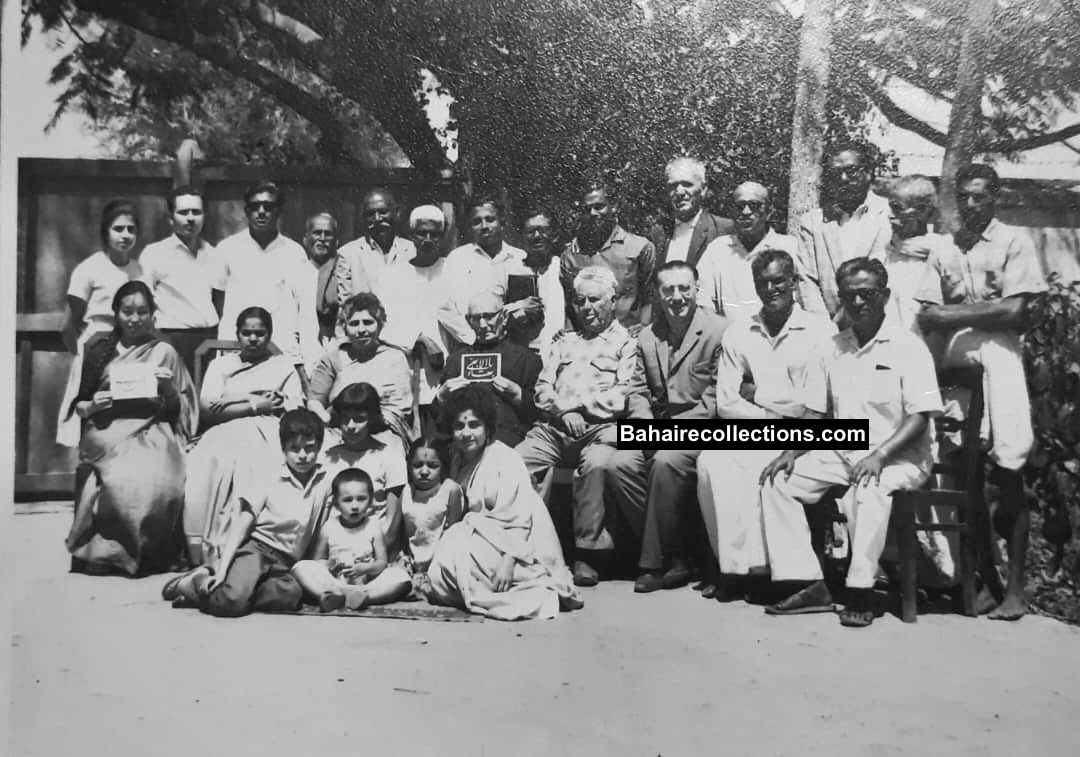
A 1967 visit by the Hand of the Cause of God Mr. Tarázu’lláh Samandarí to the Tuba Palace. On the floor L – R: Attapur, Nazanin, Monira,unknown, Qudsiah. Sitting L-R: Lingshay, Mrs. Sambandam, my mother Firoozeh, Mr. Tarázu’lláh Samandarí, my father Soroosh, Dr. Mehdi Samandari, unknown, unknown.Standing L to R Missaghiah , Anayat, L.Mohan, unknown, Ratnam, Choudappa, Krishna Patel, unknown, unknown, Shahbehram, Advocate Naidu, Sambandham, Muniswamy, Abbaya.
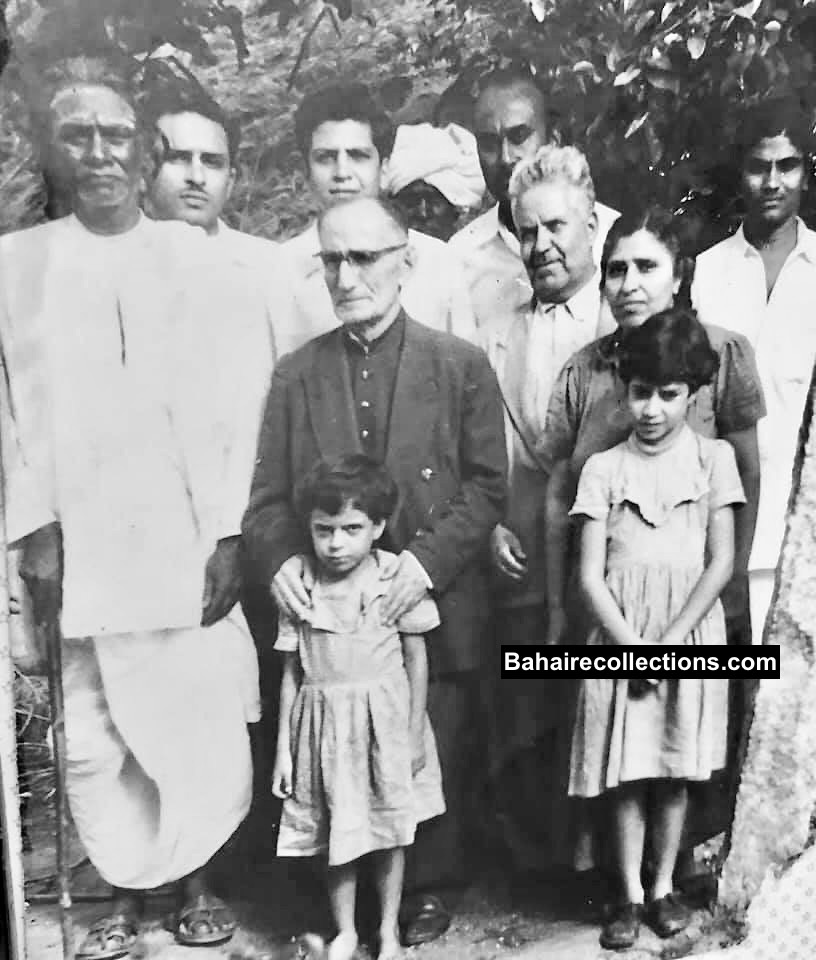
The 1967 visit by Mr. Tarázu’lláh Samandarí. Front row L-R: Nazanin and Missaghiah. Back Row L-R: Swamiji, Hand of the Cause Mr. Tarázu’lláh Samandarí, my father Soroosh and my mother Firoozeh. Back row: Anayat Yaganagi, Faiz Yaganagi, unknown, Lakshminarayan, Lakshmipathy.
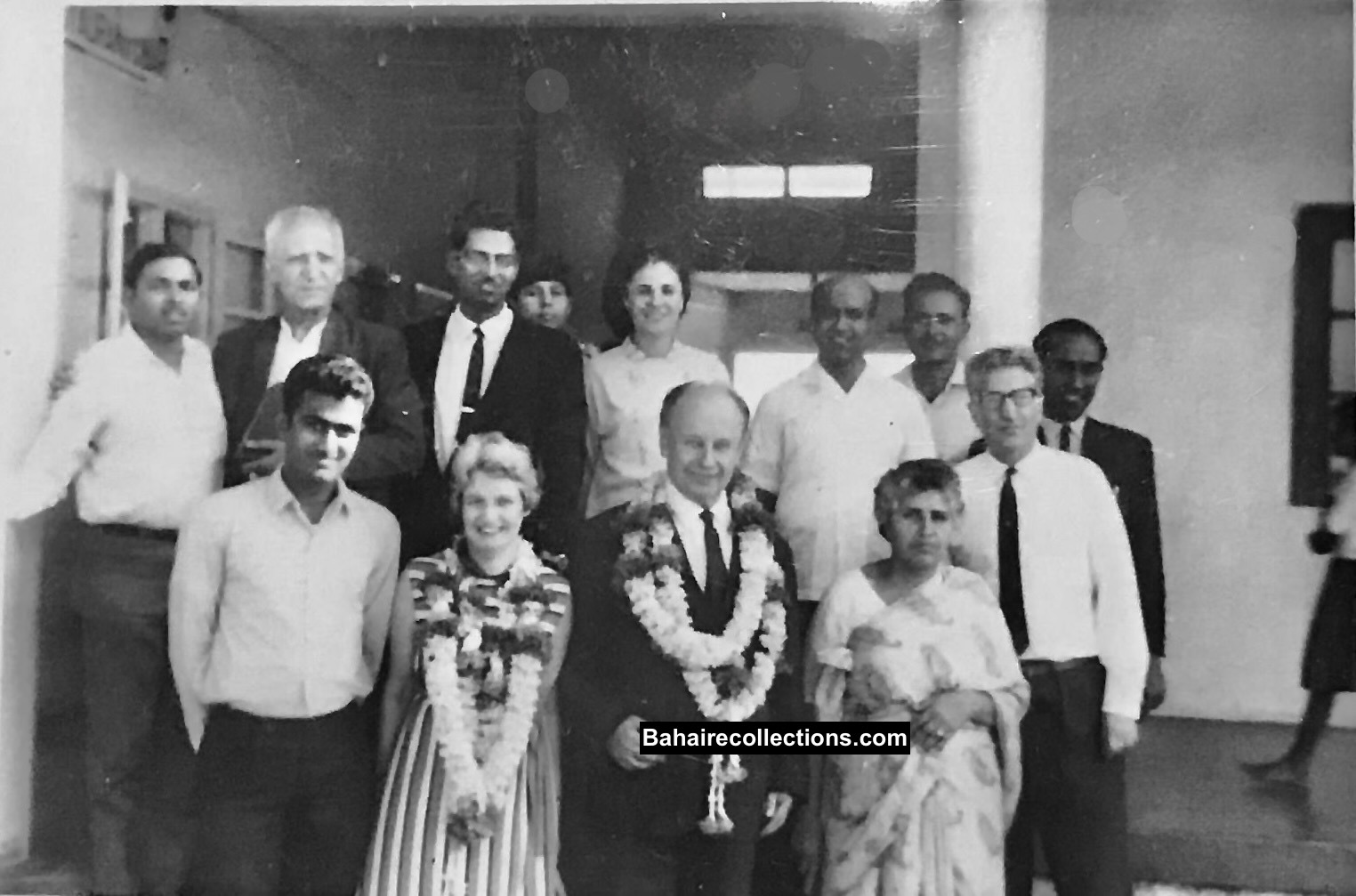
A 1969 visit by Hand of the Cause of God Mr. Adelbert Mühlschlegel. Front row L-R : Chander Lakshminarayanan, Mrs. Ursula Kohler, Mr. Adelbert Mühlschlegel and my mother Firoozeh. Back row: L to R: Sabapathy, Shahbahram Mobedzadeh, Vasudevan, Foad, Simin Moghaddas, Mr. Naidu, Anayat, Mehraban, unknown.
There were also other visitors, like Mr. Hushmand Fatheazam who visited in 1969. Mrs. Gloria Faizi stayed for a month at Tuba Palace, where she concentrated on writing her books. Members of the National Spiritual Assembly of the Bahá’ís of India, Pakistan and Burma such as Mr. Lukmani, Mr. Bakhtiari, and Mr. Abbas Ali Butt too had visited. Many members of the National Spiritual Assembly stayed at Tuba Palace when they came to meet with State Teaching Committee, and the Local Spiritual Assembly to discuss the advance of the Faith, and also to attend many national, state, and regional conferences. It was a hub of constant activities. Bahá’í Scholars from Iran such as Mr. Eshragh Khaveri and Mr. Bakhtavar conducted deepening classes for all Iranians who assembled in Bangalore.
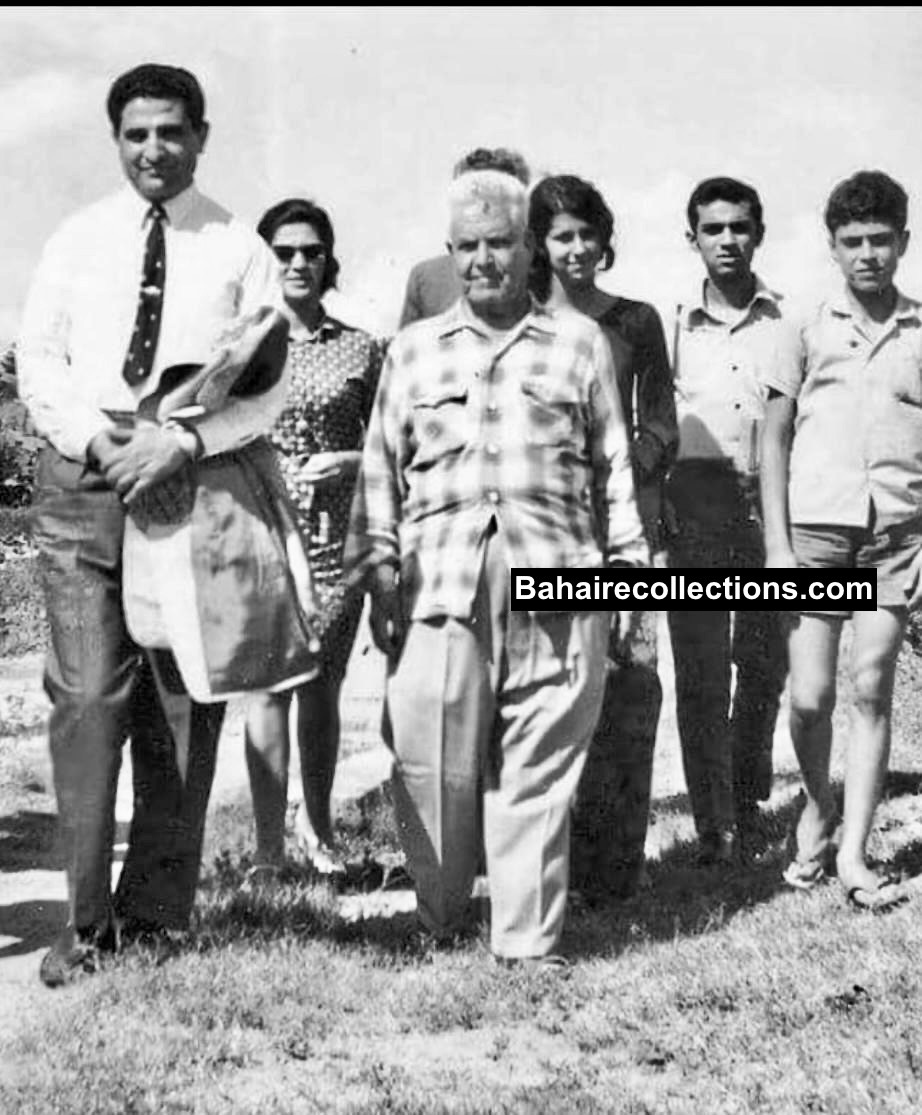
The 1969 visit by Mr. Hushmand Fatheazam. To the right of Mr. Fatheazam is my father and to the extreme right is Attapur.
Bangalore become a very active community for mass teaching. Many traveling teachers passed through, and always stayed at Tuba Palace. Mr. Shahbahram Mobedzadeh visited us regularly. He was from Pune but was sent by the National Spiritual Assembly to visit the Bahá’ís in the Southern States. He was a great teacher of the Faith. He woke up very early in the morning and chanted prayers aloud in Farsi. Mr. S. Vasudevan from Malaysia lived at Tuba Palace for many months when he first arrived from Malaysia in 1967. Tuba Palace was his hub. Mr. Sababathy Alagiah who later married my sister Qudsiah in 1968, who also arrived as a Malaysian pioneer to India on the same day as Vasudevan, had made Tuba Palace his hub. Dr. Muhájir brought these two vibrant teachers to Tuba Palace.
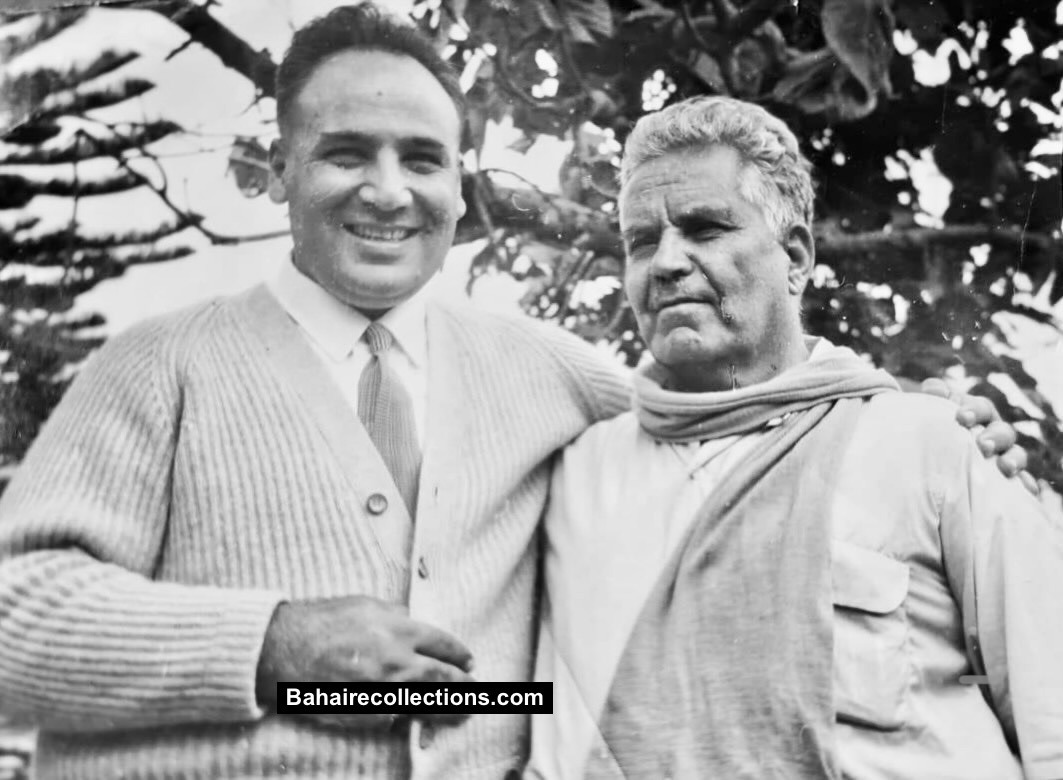
A 1963 photo. The mutual love between Dr. Muhájir and my father was boundless.
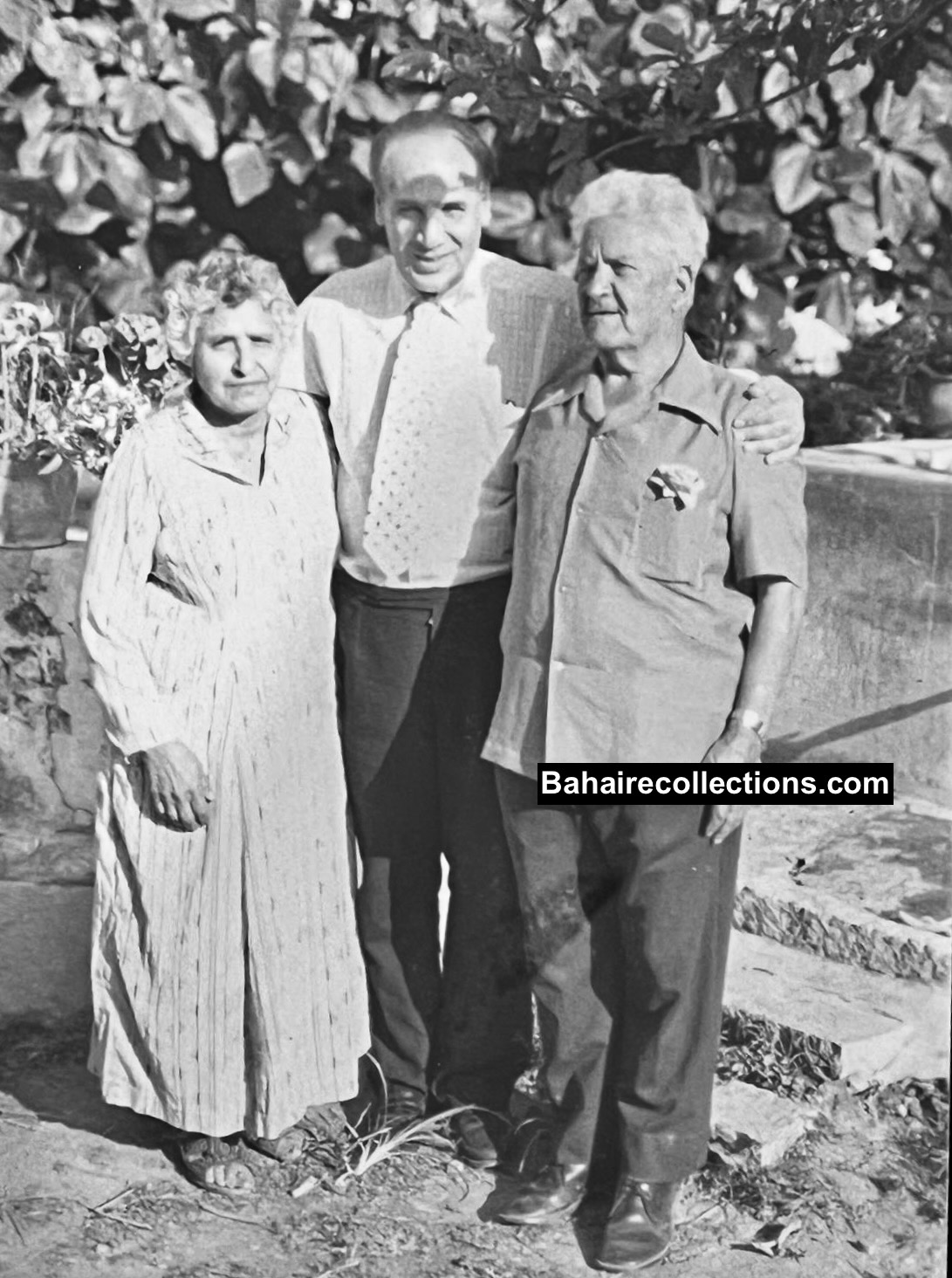
Dr. Muhájir at Tuba Palace in 1979. Dr. Muhájir flanked by my mother Firoozeh at left and my father Soroosh at right.
FATHER LED THE WAY
My parents were both very spiritual people, though they had no formal education. But what they have accomplished for the Faith and for the family is phenomenal. It has to be mentioned that my parents inculcated Bahá’í principles and values in us children from our childhood days. The eight siblings are four boys and four girls. The boys are Anayat, Farrage, Faiz, and Attapur, and my sisters are Tuba, Qudsiah, Nazanin and my own self, Missaghiah. We are forever indebted to our parents for giving us the Faith and nurturing us in the Bahá’í way.
My father chanted many prayers every morning. This helped the children memorize many of the prayers and poems. Also, before the children left for school, they had to say their prayers. My parents and we eight siblings had devotions every night after dinner. After prayers by each one of us, a selected book was read.
My father had a fund box made of Rosewood placed in the living room at Tuba Palace. All the children and Bahá’í friends were encouraged to contribute to the fund. The members of the Local Spiritual Assembly enjoyed counting the coins regularly, and surprisingly, a big sum was collected, and the donation was sent to the National Spiritual Assembly.
My father was a voracious reader of Bahá’í books. In the early years, a few Bahá’í books were printed in Farsi in Karachi and brought to Bombay. And later were printed in Bombay. As soon as my uncle Isfandiar found out that a new book was available, he got the night train to Bombay to buy the books and returned to Pune the next morning. He read the books and mailed them to my father in Bangalore. My father would transcribe the books with his own hand and return them to my uncle Isfandiar. After that, my uncle Isfandiar displayed these books in a showcase at the National Hotel in Pune. There are many volumes of these handwritten books by my father.
My father read Bahá’í books as though he was going to write a thesis. He used to go line by line, underline some parts and wrote notes in the margins. It was through this example by my father that we siblings developed this craving to read for knowledge. Thus, even at an early stage, we became avid readers.
MOTHER’S SERVICES
After my mother got married, she and a few other Iranian mothers started moral classes for their children in Pune. This group of ladies later started a school and named it “Ideal Baha’i School”. My mother helped teach handicrafts, sewing, and knitting to the children at the Ideal Bahá’í School in Pune. A few years later the school was transferred to Panchgani to become the New Era High School.
My mother was brilliant at learning new languages. This strength of hers helped with teaching the Faith to a wider circle of people. She spoke Farsi, Gujarati, Marathi, English, Kannada, Tamil, and Urdu very fluently. She had heard that Esperanto had the potential of becoming a universal language. So she studied Esperanto too. Before her passing in Laos, she was learning the Lao language, so that she could start teaching in areas around Vientiane, Laos.
When in Bangalore, my mother always wanted a school in the village of Karianapalya. She was always encouraging parents to send their children to school. The children had to help with grazing the cattle, especially the girls. The closest government school was about 3 1⁄2 miles away in Shivaji Nagar, which was impossible to attend due to not having any transportation. The private schools were very expensive. My mother was the first woman appointed to the Village Panchayat (Council) of Saitpalayam and Karianapalya and was also the Chairperson. The first thing she did was to rally on getting a teacher and starting the school. My mother would visit all the homes and encourage parents to send their children to school. She was also successful in getting the girls to come and join the schools. She urged the Bahá’í travelers who passed through Bangalore to support the school with funds for stationery and books. A hall was built near the Kariyanapalya Bahá’í Center, a teacher was hired, and the school was established. The school was from grades one to four. The Bahá’í Center was also used for additional space to teach and to feed the school children. Bus route number 55 started and after their fourth grade, the girls went to Nirmala High School, and the boys went to the government school in Shivaji Nagar.
My mother was at the forefront of social justice too. She took an active role in the rights of women and workers, and the rights of the “harijans” or low caste people. These were foremost in her agenda, and she involved us all in her activities.
She would go to the homes of the Dalits (harijan) and eat in their homes and would invite them to eat at our home. She took care of all the harijan people in our village, and even fought with local authorities to get them their own land on the outskirts of our village. Although it was considered a taboo, my mother hired them to work in our house and farm. There were talks in the village when she initially did that and initially some people refused to eat anything in our house, but she went ahead. She knew that was what the Bahá’í Faith was all about.
My mother distributed extra fruit and vegetables that we grew on the farm to people who needed them. We had a bakery on the premises of Tuba Palace. The poor people got their bread at a minimal price as many could not afford it. Each year the Parsees of Bangalore would come to our farm after their Persian Naw-Rúz and have a big celebration of meeting each other. My parents provided them with ample food.
As a lover of humanity, my mother treated everyone with boundless love. The farm in Tuba Palace had a lot of fruit trees and vegetables for our daily use. The neighboring children would come over, and we would play a lot of games.
The Bahá’í holy days of Naw-Rúz and Ridván were celebrated throughout the whole community. On Naw-Rúz day sheep were slaughtered, and cooks were hired to make biryani (rice/meat dish) with all its sides and was served to people in the surrounding villages. Many Bahá’ís and friends from our neighboring villages attended. Some poor people were given portions of the meat to take home. The main gate was left open for whoever wished to come and eat.
JOY OF NINETEEN DAY FEASTS
Until the early 1950’s the family attended the Nineteen-Day Feast at the Palm Road Bahá’í Center in Frazer town, which was their family home. Ms. Doherty, who tutored Anayat, Farrage and Faiz, also taught English to my parents and we siblings. Ms. Doherty was the caretaker at the Center and was a great hostess. After a few years, in the late 1950s, the Bahá’í Center was relocated to Mr. and Mrs. Vittal’s residence. They were among the oldest believers of Bangalore.
And when the Bahá’í Center moved to Vittal’s house, the Yaganagi family had to catch two buses and walk one and a half miles to attend the Nineteen Day Feasts. The older boys used their bicycles to help the younger ones get to the bus stop at Davis Road or Palm Road. It was not easy for the family to get on the bus. My mother had to do a head count after all the children got on the bus.
Yet, it was a joy to see many friends at the Feast. Mrs. Fitzgerald, an elderly lady and one of the early believers of Bangalore brought her heavy accordion and sang many uplifting songs together with all of those that attended. She used to sing and dance as well. My father would also get up and dance with her. Some of the younger children dozed off during the feast. Dr. Saroja Bai made the most delicious tea and served it in beautiful special glass tea cups. Dr. Saroja Bai and my eldest brother Anayat were classmates at the Bangalore Medical School. She spoke good Tamil.
When the Local Spiritual Assembly was established in Sait Palayam and Kariyanapalya the Feasts were observed at Tuba Palace. My father prepared the physical arrangements for the Feasts, while my mother prepared the refreshments. The attendance was great-around 25 to 30 attended. Sunday Devotions were held at Tuba Palace at 8:00 am, but after the Bahá’í Center was built it was moved there so we could accommodate the large numbers that attended. When we had meetings in the evenings there was a person called the Village Crier (Thoti), who helped call the village people to the meetings.
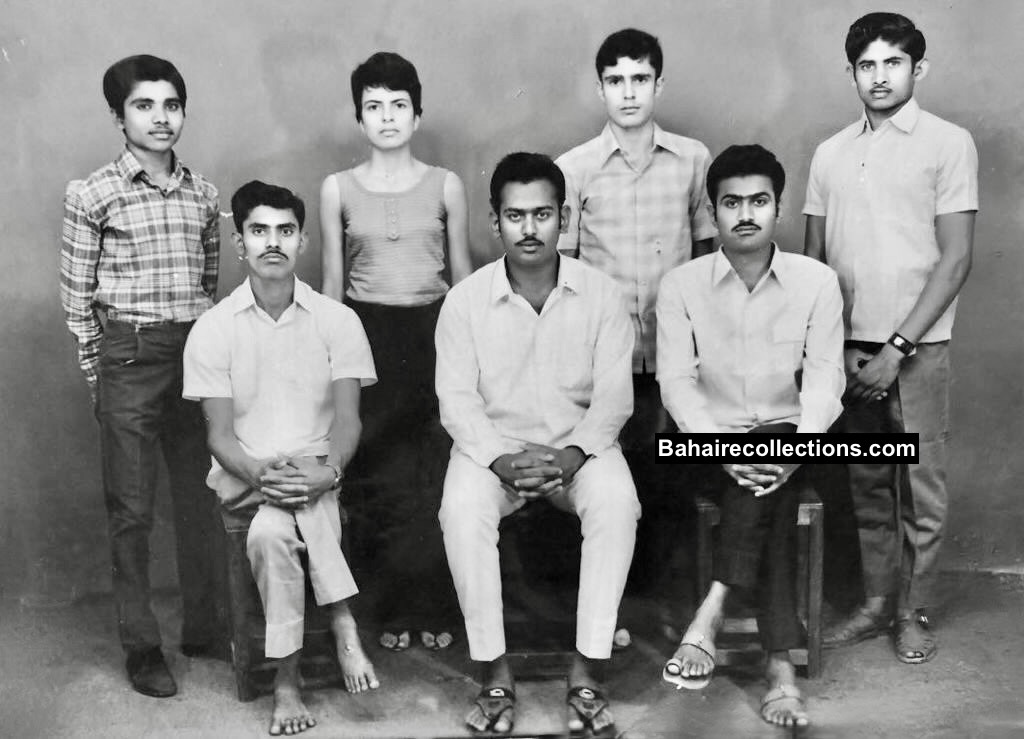
1968 Youth committee of Saitpalayam and Karianapalya. Standing L to R: Gowreesh, Nazanin, Attapur, Rambahadur. Sitting L to R: Kodanramaiah, Srinivas, Chander Lakshminarayan.
PIONEER FAMILY
All the days of their lives my parents worked hard to get their children educated spiritually and academically. All their eight children were able to pioneer to various places in this wide world.
Anayat Yaganagi
My eldest brother Anayat was born on April 5, 1936, in Pune. He became a medical doctor. He worked at the Victoria Hospital in Bangalore, then pioneered in Ceylon (Sri Lanka) for a couple of years. On his return from Ceylon, he started the Yaganagi Clinic at Tuba Palace, and many patients from the surrounding villages came to this clinic. Anayat traveled to Bombay and over there he met a high official from the Government of Bhutan who encouraged him to go to work in Bhutan, and to be the doctor for workers building the road from the border of India to Phuntsholing in Bhutan. He accepted the offer and pioneered to Bhutan.
He married Lingshay Foning, who was from the Lepcha tribe of Kalimpong near Darjeeling, and they have 6 children: Monira, Vedah, Medon, Geeti, Isfandiar, and Kesang. Anayat was Chief Medical Officer and Director of Health for the government of Bhutan. He was bestowed Bhutanese citizenship due to his dedication to the people of Bhutan. He was instrumental in eradicating Leprosy from Bhutan. Anayat and Lingshay pioneered to Gelephu in Bhutan.
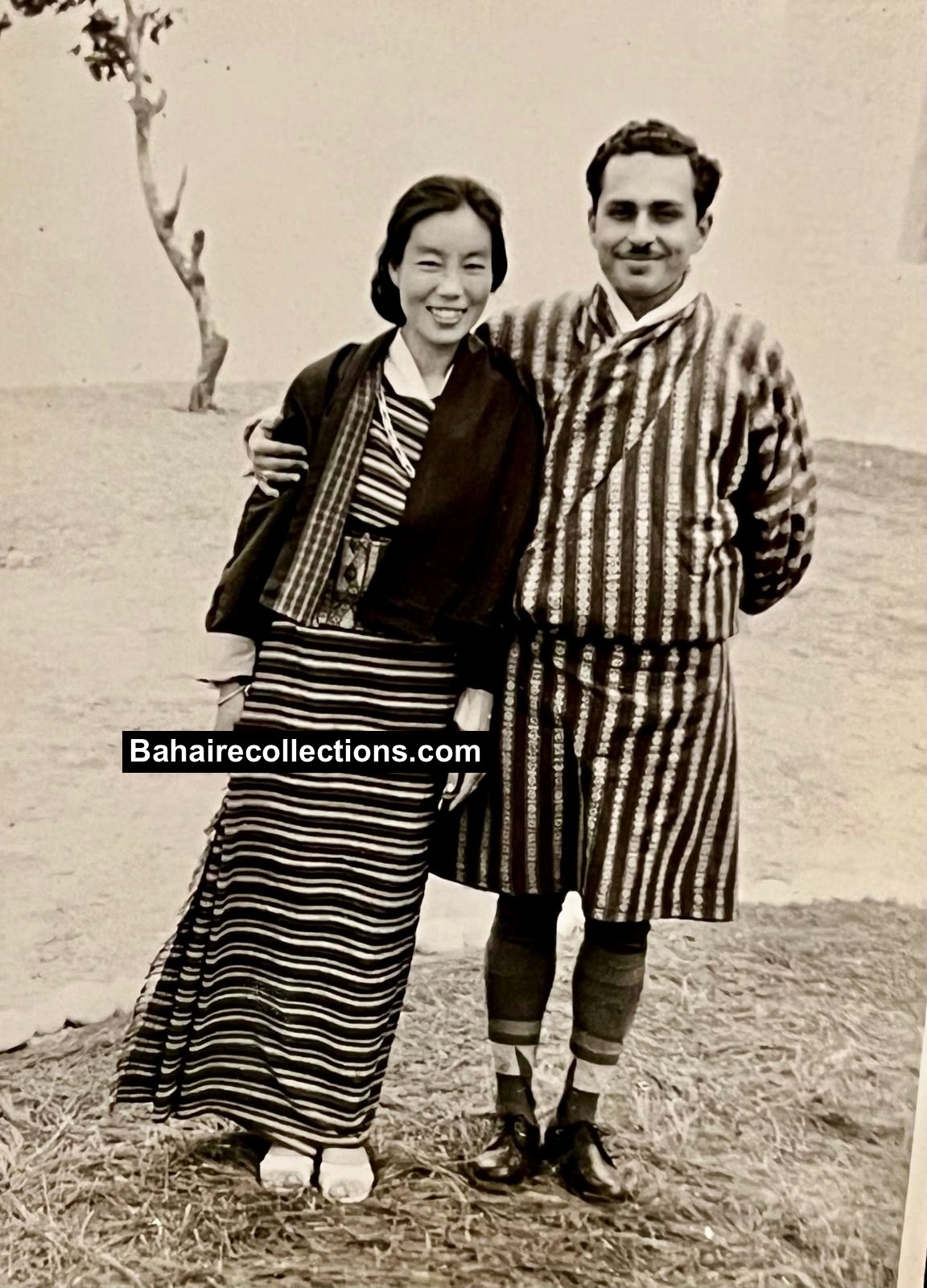
Lingshay and Anayat
Farrage Yaganagi
My brother Farrage was born July 6, 1938, in Pune. He had degrees in Commerce and Law. He managed the Mubarak Hotel for many years. The income supported the children’s education, and the Bahá’í teaching efforts. He later pioneered in Goa and Daman in South West India for many years, and then went to manage the Lucky Restaurant in Pune for many years.
He married Hamra Fazil in 1968. It was her father who helped with teaching the Faith in Bangalore. They have five children – Izzat, Badi, Shariar, Hadi, and Lua. The family pioneered to Laos for many years, and then came back to India in 1975 on the request of Hand of the Cause Dr. Muhajir to assist his parents with the teaching of the Faith in Bangalore and the surrounding communities.
The National Spiritual Assembly of India requested Farrage and Hamra to go to Jaigoan, a census town in West Bengal, India, on the border with Bhutan and manage the Bahá’í school. They stayed there for two years before returning to Bangalore to continue teaching the Faith locally, stationing themselves in Tuba Palace. Farrage served the Faith in his capacity as an Auxiliary Board member and a member of the State Bahá’í Council of Karnataka state for a number of years. He was a Bahá’í Scholar. Many victories for the Faith were accomplished during his time, and the Bahá’í Faith spread widely.
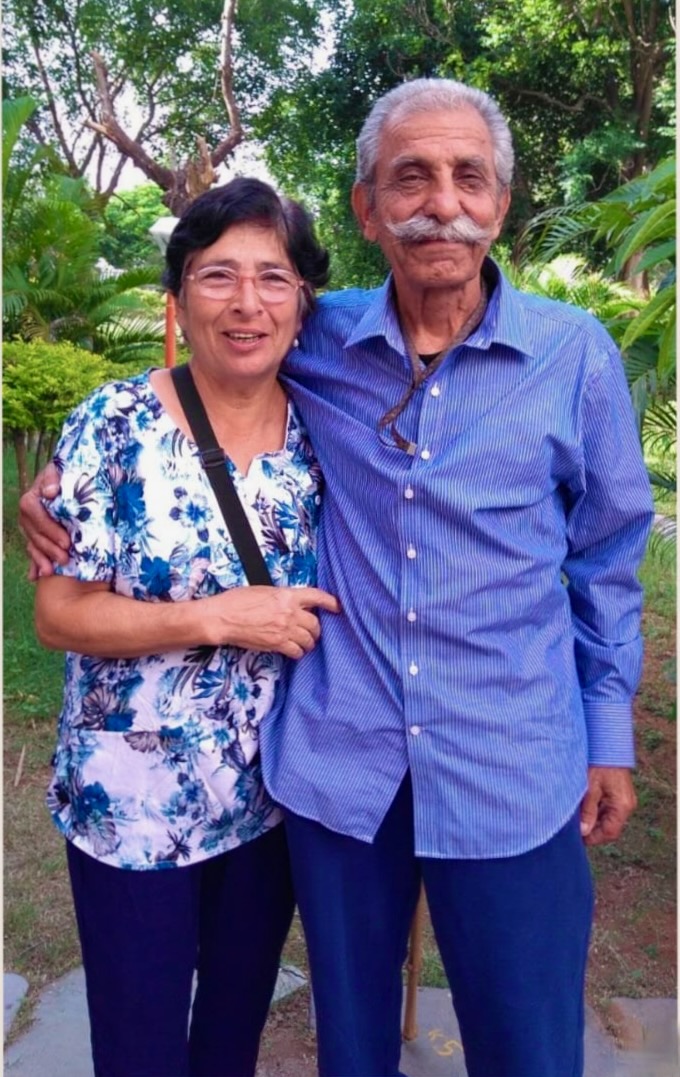
Hamra and Farrage
Faiz Yaganagi
My brother Faiz was born June 4, 1940, in Pune. He received a degree in Mechanical Engineering. He was in Bangalore after finishing his studies, when he met Dr. Muhajir who encouraged him to pioneer to Laos. He obeyed instantly. He is fondly known as “Papa” in Laos. He married a local lady in Laos- Mueng Ma. They have five children – Hooshmand, Aroun, Sengpachan, Anis, and Node. His family have taught the Faith in many provinces in Laos.
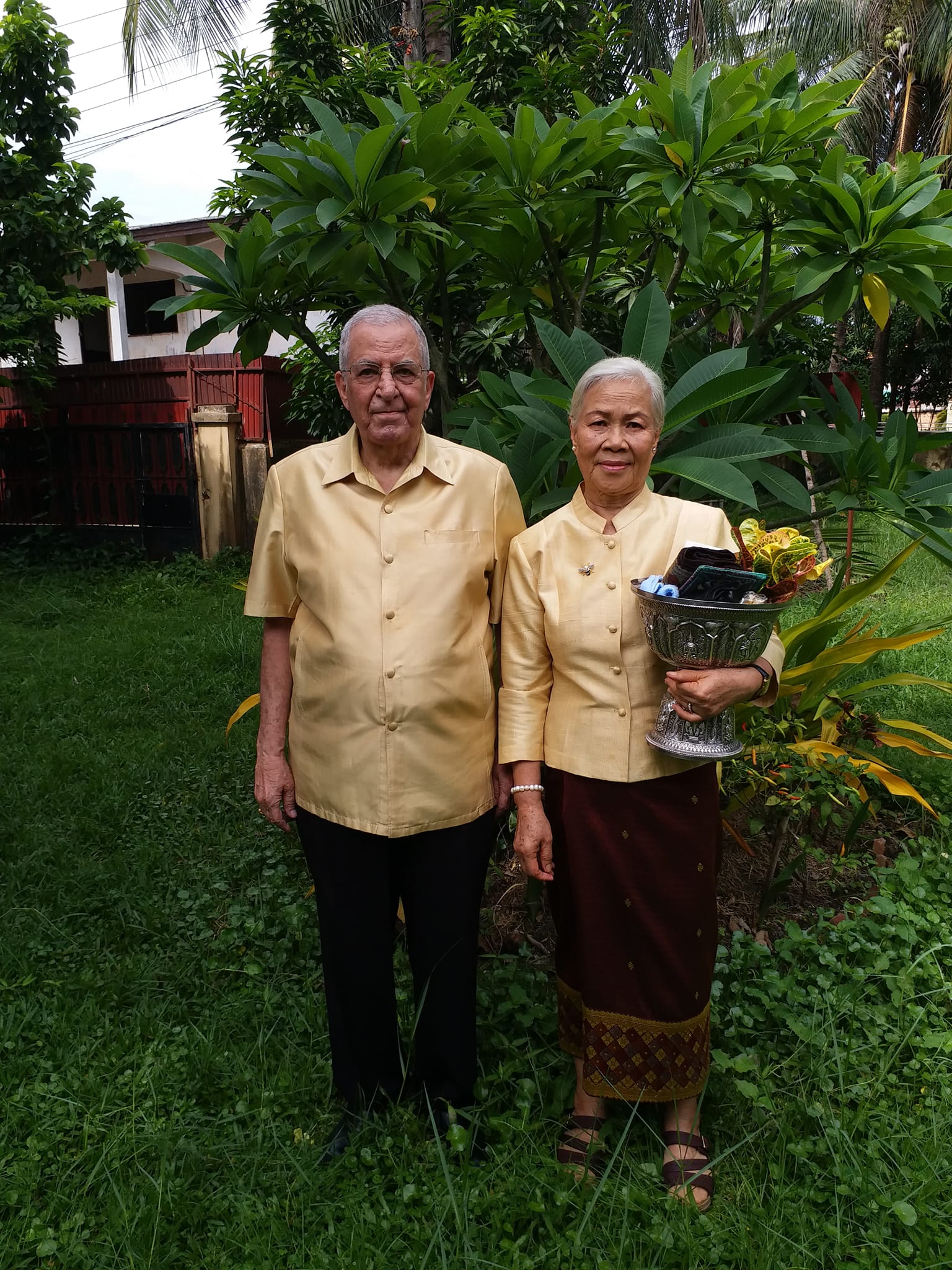
Faiz and Muengma
Tuba Yaganagi Munje
My sister Tuba was born when they lived at the Bahá’í Center on Palm Road on 14 March 1944. She married Mohan Munje in 1964 in New Delhi and then lived in Kanpur until her daughter Tina was one year old. They have two children – Tina and Muhit. With the encouragement of Hand of the Cause of God Dr Muhájir in 1967, her family pioneered to Kathmandu, Nepal for seven years. The first National Spiritual Assembly of Nepal was elected while they lived there.
Again, with advice from Dr. Muhájir, Tuba’s family, pioneered to Calcutta in Bengal for eleven years. Tuba was able to continue her distance education in Sociology, which proved very useful in her Social Action Projects for the Faith. Upon the request of the National Spiritual Assembly of the Bahá’ís of India, the family moved to New Delhi for 11 years as pioneers. Her husband Mohan served as the Manager of the Publishing Trust, while Tuba served on the staff of the Bahá’í House of Worship as the librarian for ten years. She also served two terms as Auxiliary Board member for Delhi and Haryana. Owing to health reasons, they then moved to Bangalore for seven years and served on the Local Spiritual Assembly and the State Bahá’í Council. They then finally pioneered to serve in Gwalior. They volunteered for their service at the Rabbani School. Mohan headed the Moral and Social Activities Department, while Tuba assisted him. Mohan passed away on 3 December 2012 in Gwalior, Madhya Pradesh, India. Tuba continues to live and serve the Faith in Gwalior after the passing of Mohan.
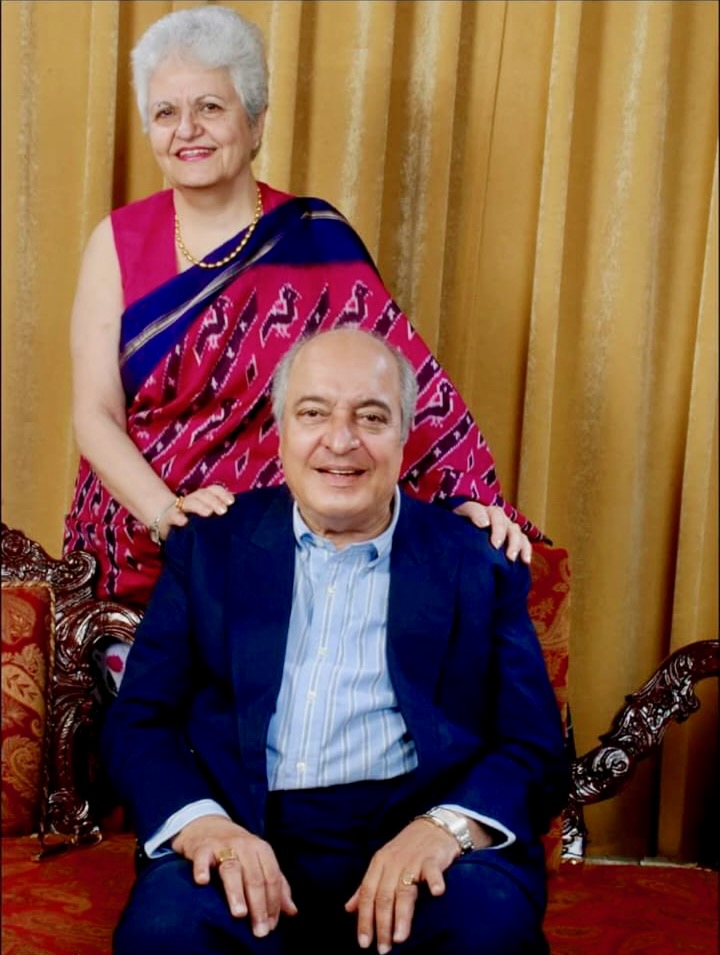
Tuba and Mohan
Qudsiah Yaganagi Sabapathy
My sister Qudsiah was born in Bangalore on September 20, 1947. She had a master’s degree in Sociology. She married Sabapathy Alagiah, who is a pioneer from Malaysia, in 1968. They have three children – Nedah, Nemat, and Nabil.
The family initially pioneered in Laos for a few years, and then moved back to Malaysia. After a few years, they pioneered to Madras in Tamilnadu. The family later pioneered to Mozambique, where Qudsiah served in the Ministry of Education for some years, and then practiced Homeopathy, while Sabapathy worked in Telecommunications.
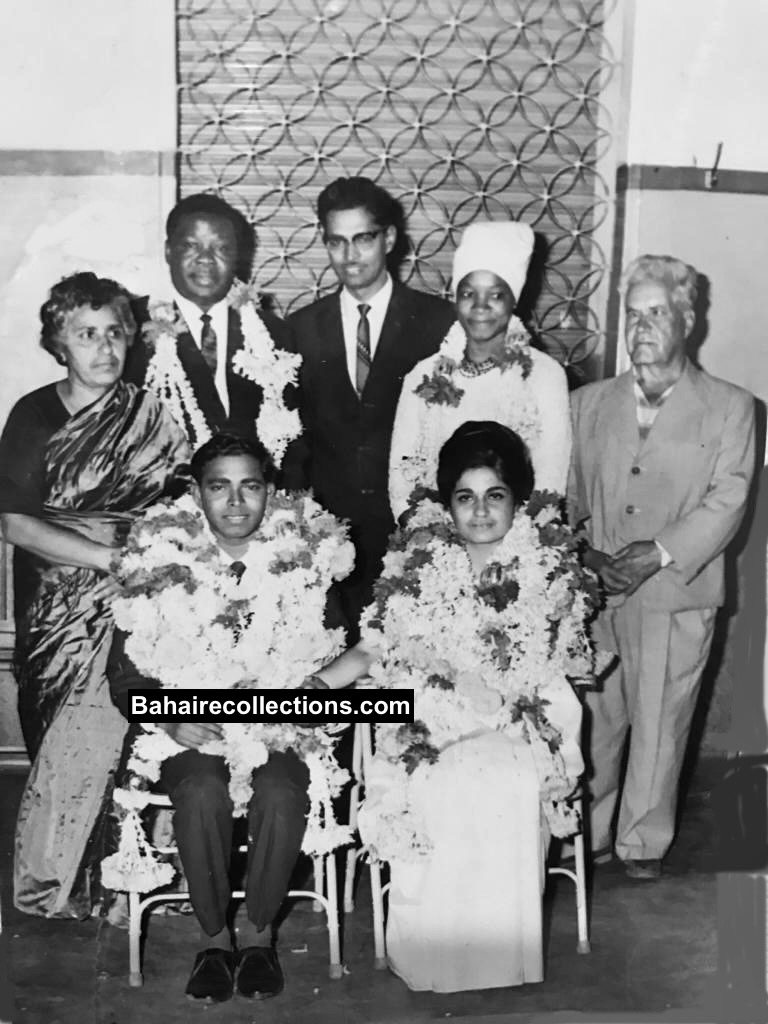
Marriage of Sabapathy and Qudsiah. Standing L-R: My mother Firoozeh, Hand of the Cause Mr.Enoch Olinga, Vasudevan, Mrs. Olinga and my father Soroosh
My own self -Missaghiah Yaganagi
Missaghiah or Mesu, as I am called, was born on 26 November 1949 in Bangalore. In 1972 Dr. Muhajir was visiting my family in Bangalore and asked if I could travel to East Africa to accomplish the remaining unfinished goals of the Nine-Year Plan assigned the National Spiritual Assembly of Tanzania. I gladly accepted and pioneered to Tanzania in 1972 with a group of nine youth from India. While still in the pioneering field, I married Bahman Rowhani in Dar-es-salaam, Tanzania in 1973. In 1974, Bahman and I pioneered to Laos. In 1975, we returned to Iran due to some unusual circumstances, but then pioneered to Sharjah in the United Arab Emirates in 1980. We have two children – Vahid and Anita. In1985, my family relocated to the USA. I have just retired as an educator.
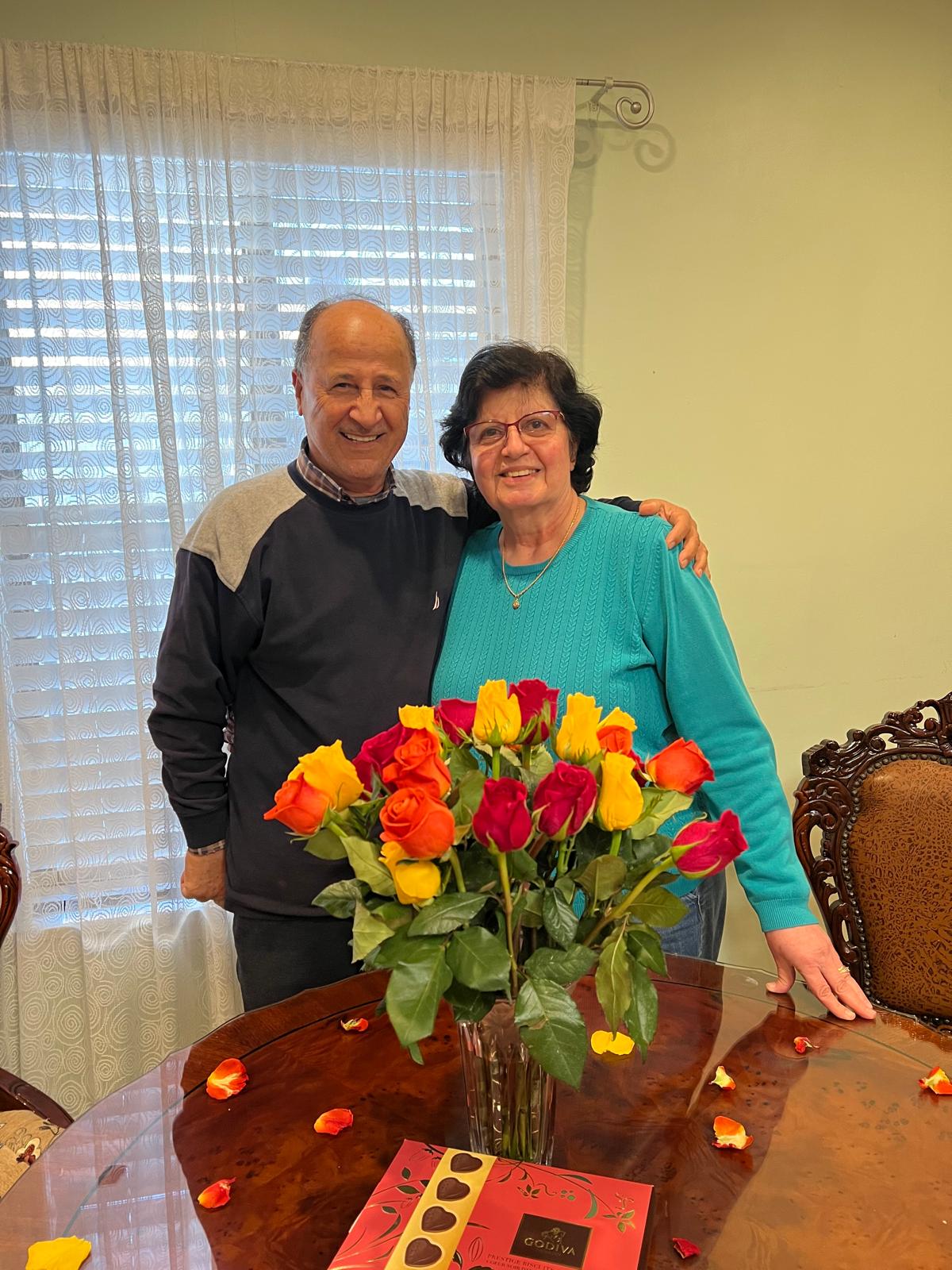
Bahman and Missaghiah
Nazanin Yaganagi Bidenjeri
My sister Nazanin was born 19 May 1953 in Bangalore. She married Adib Bidenjeri. After completing her education, she taught the Bahá’í Faith in South India. They have 3 children – Verity, Shekufeh, and Behin. Her family then pioneered in Dubai, United Arab Emirates, where she presently resides.
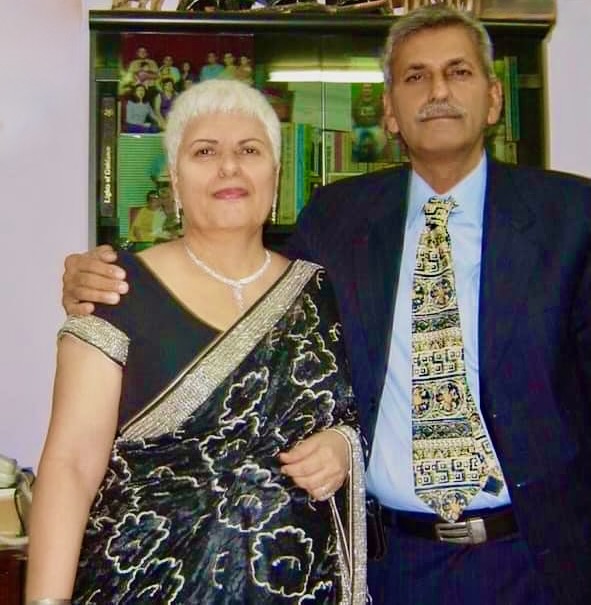
Nazanin and Adib
Attapur Yaganagi
My brother Attapur was born on August 12, 1956. Attapur studied to be an Automobile Engineer in Madras. He married Sheela, and they have 2 children – Carmel and Siddharth. Sheila and Attapur stayed in India for a few years after their marriage, but Dr. Muhájir encouraged them to pioneer to Phuntsholing in Bhutan. He set up a Particle Board factory for the government of Bhutan. Atta returned to Bangalore, where they continued to serve the Faith.
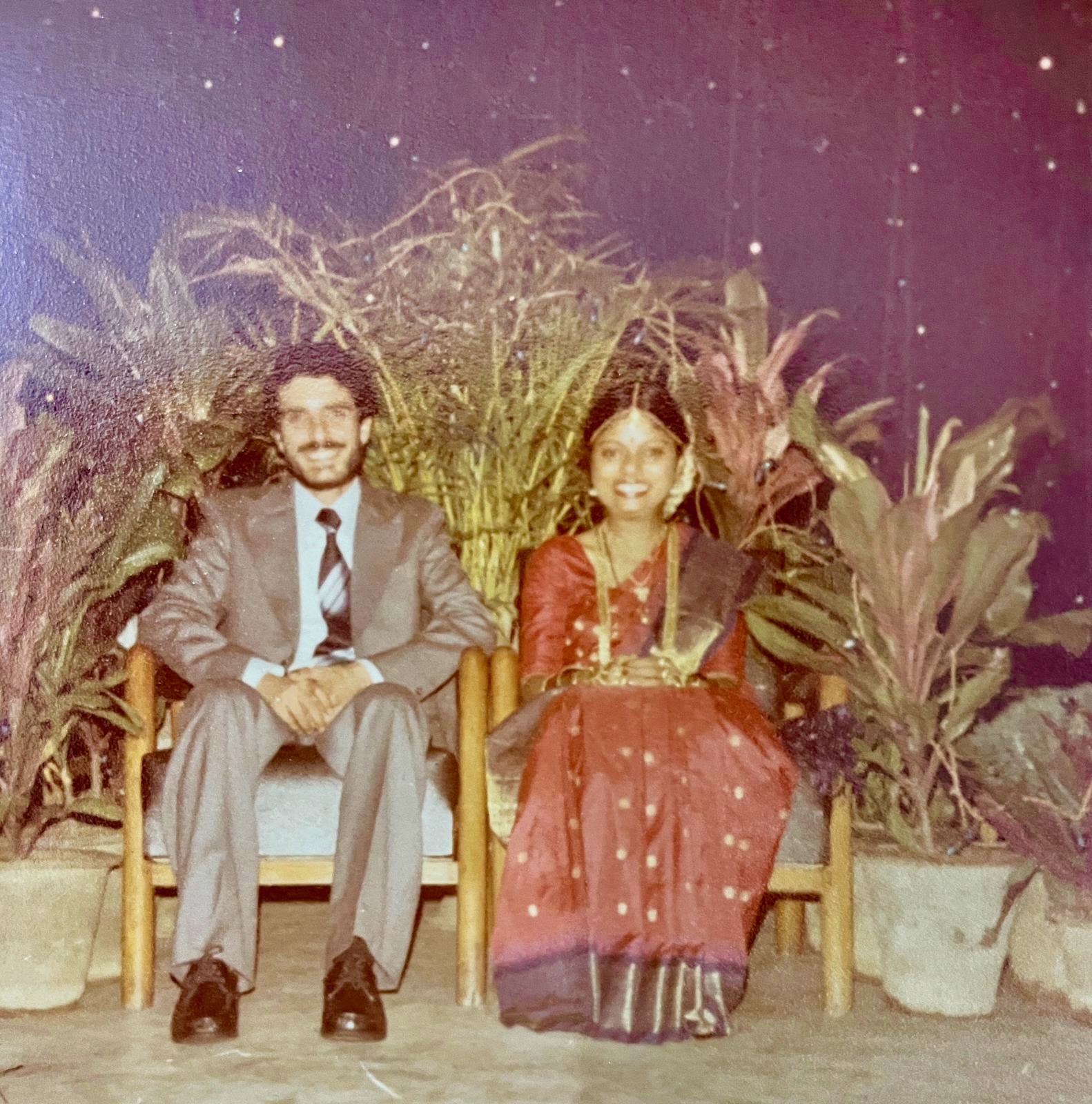
Attapur and Sheela
TRAVELS OF MY PARENTS
My father went on teaching trips to Madhya Pradesh in India, and on an extended trip with Professor Laxminarayan to the states in South India. My parents traveled to visit Anayat, Lingshay and their family in Thimphu, Bhutan. They visited Tuba and Mohan and their family in Kanpur, Delhi and then in Calcutta and Gwalior. They regularly visited Nazanin and Adib and their family in Dubai. They also met me and my husband Bahman and our family in Sharjah. They regularly visited the rest of the family in India. My mother would visit her family who were ill and take care of them for months.
WITH ABIDING GRATITUDE
Both my parents lived a life of sacrifice. They may not have been well-educated owing to the culture in Iran in those days. But they were very mature in their thoughts and wisdom. More than that, they had understood the mission and the spirit of the glorious Faith of Bahá’u’lláh. And they strived to inculcate the Bahá’í values in us. Their first sacrifice was to the beloved Bahá’í Faith, and then to their children.
My mother gave us the greatest encouragement to study daily. Although we grew up in a small village in India, all of us received high level education. My mother was instrumental in getting us admitted into our schools and colleges.
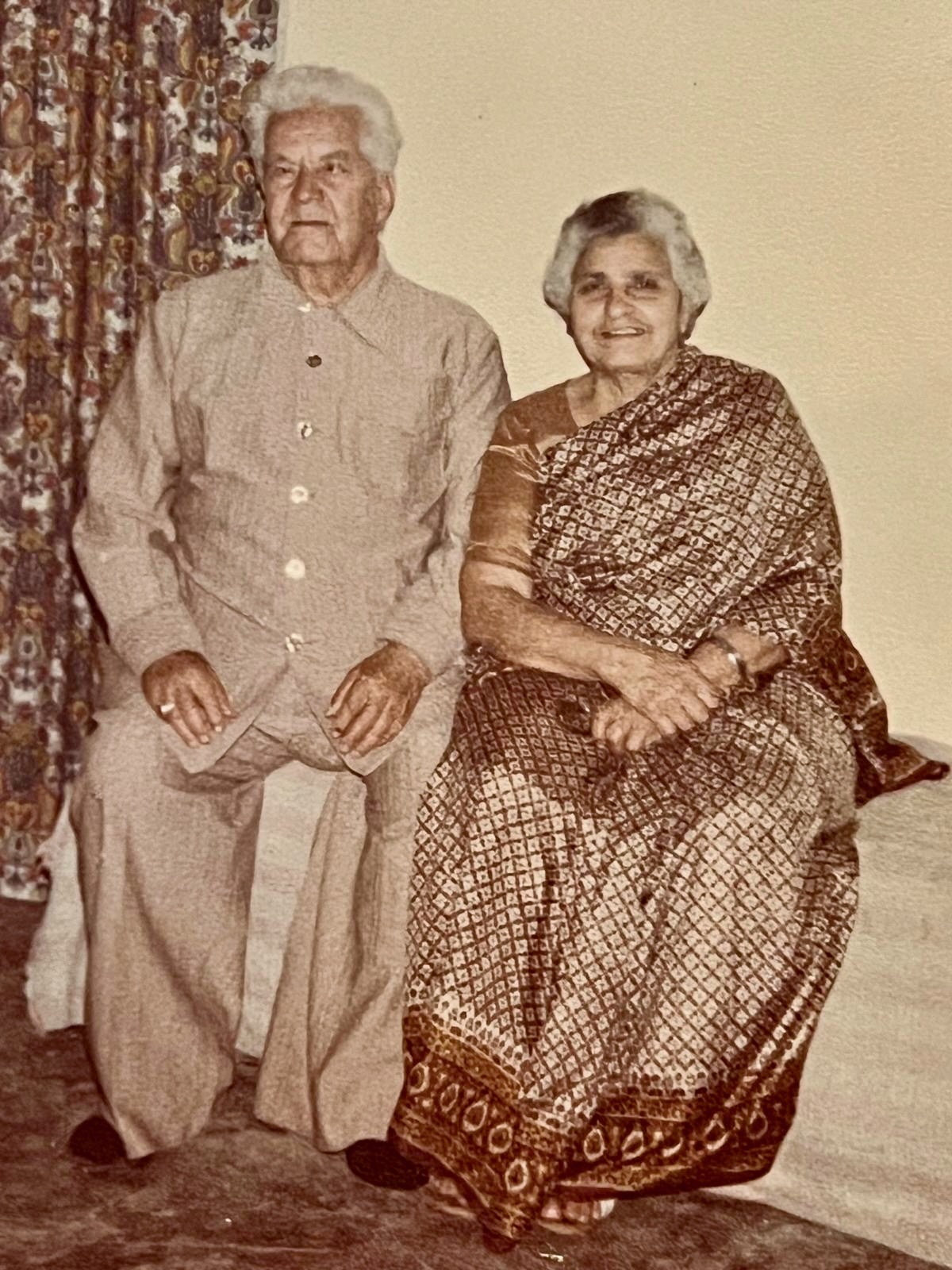 My mother Firoozeh Yaganagi and my father Soroosh Yaganagi
My mother Firoozeh Yaganagi and my father Soroosh Yaganagi
My parents got us involved in the activities of the Faith and social work even at a young age. We carried out service projects on the weekends by teaching at children’s classes at our house and also at the Bahá’í Center in the village. We went to nearby villages to give medical help with Dr. Saroja Vittal, whom we called Dr. Saroja Bai and my eldest brother Dr. Anayat. We also had a medical clinic in our house and my eldest brother Anayat served the community as a doctor. The clinic was free and only those who could pay offered him money. My father came forward and paid for all the medicines whenever the poor could not afford them. My parents provided accommodation for all Bahá’í travel teachers that came to Bangalore, and also for those who passed through this city.
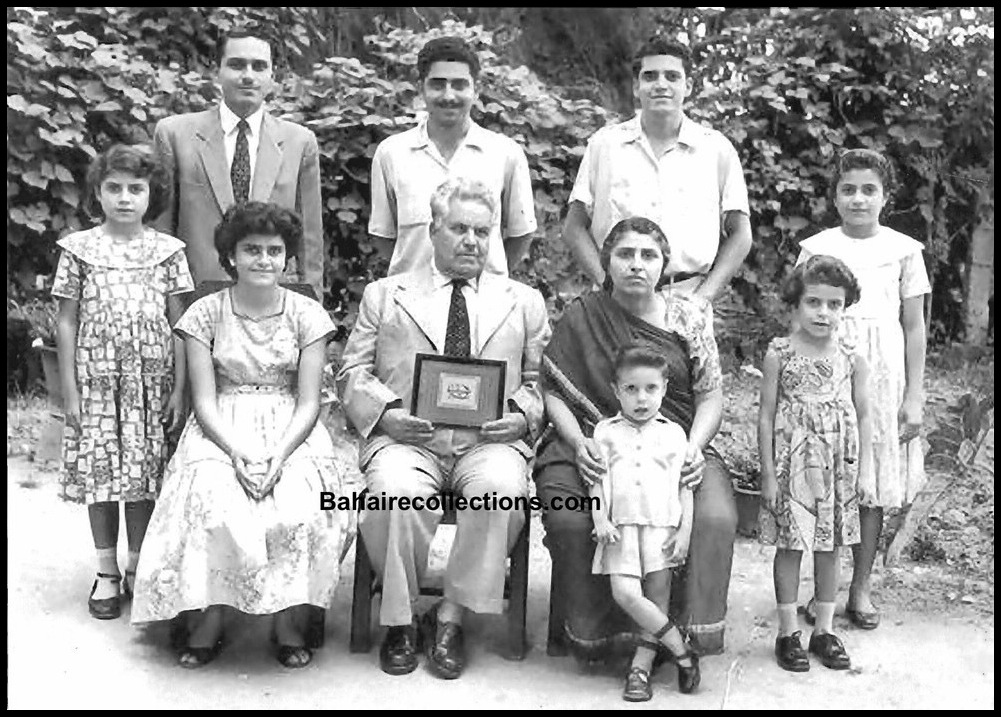
Looking back at 1960: Front row L-R: Missaghiah Yaganagi Rowhani, Tuba Yaganagi, my father Soroosh, my mother Firoozeh, Attapur Yaganagi (in front of my mother Firoozeh) and Nazanin Bidenjeri. Back row L-R: Anayat Yaganagi, Farrage Yaganagi, Faiz Yaganagi , Qudsiah Yaganagi.
My parents never used a foul word nor physically punished us. All their training and discipline were through what the Bahá’í writings taught. Both of them achieved the goals they set for themselves- establishing the Faith on a strong footing in Bangalore and the surrounding areas, bringing up their children the Bahá’í way, and serving the Cause and humanity relentlessly till their last breath. My father passed away in Dubai, United Arab Emirates on 10 April 1991 and my mother passed away in Vientiane, Laos on 27 April 2002.
On learning of the passing of my father, the Universal House of Justice sent this cable dated 10 April 1991 to the National Spiritual Assembly of India:
GRIEVED PASSING SAROOSH YAGANEGI VERY FIRST PIONEER SOUTH INDIA WHO FOR NEARLY HALF A CENTURY PERSEVERED AT HIS POST AND WAS REGARDED SPIRITUAL FATHER BAHAI COMMUNITIES THAT REGION. HIS SELFLESSNESS SINCERITY AND COMMITMENT TO SERVING THE FAITH SET EXAMPLE TO TENS OF THOUSANDS OF BELIEVERS IN SOUTHERN INDIA WHERE HE RAISED THE BANNER OF BAHAULLAH FOR THE FIRST TIME.
ADVISE HOLD MEMORIAL GATHERINGS IN SOUTH INDIAN STATES. ASSURE HIS WIFE, CHILDREN, FRIENDS LOVING PRAYERS HOLY SHRINES BESEECHING PROGRESS HIS RADIANT SOUL ABHA KINGDOM.
UNIVERSAL HOUSE OF JUSTICE
All their thoughts and actions were centered on the needs of the Faith, and they strove not only to teach the Faith through words, but also through the lives they led. When some of my siblings wanted to marry into other races, they gave us their fullest blessings in light of the Bahá’í Teachings. They were pioneers, who brought forth children who all pioneered to some countries at some point in their lives. We all have done well both in the Faith and in financial strength, all with their blessings. Through our marriages we have produced third, and even fourth generations who are all Bahais and serving with distinction in various corners of the globe. It is beyond the scope of my story in covering all those in the next generations. Suffice to say the genesis of our success as believers goes to our good upbringing.
Say, O My people! Show honour to your parents and pay homage to them. This will cause blessings to descend upon you from the clouds of the bounty of your Lord, the Exalted, the Great.” – Bahá’u’lláh.
Missaghiah Yaganagi Rowhani
Culver City
California
USA
30 November 2024
SOURCES
- Shoghi Effendi, Dawn of A New Day
- Shoghi Effendi, Messages to the Indian Subcontinent
- Violette Nakhjavani, Amatu’l-Bahá Visits India
- The Bahá’í World, Volume, 9
- Narratives from our parents, as corroborated with my siblings.
Copyright©bahairecollections.com
37 thoughts on “THE YAGANAGI FAMILY OF BANGALORE”
Dear Mesu,
Thank you so much for penning this most moving story on the services of your illustrious parents, which to me appear to be quite unparalleled when viewed in some ways. They may not have been formally educated as you have mentioned in your story, but their level of understanding of the Faith is clearly so deep and vast. They are surely touched by the spirit of the Faith; otherwise how would it be possible for them to have risen to sacrifice so much and serve the Faith relentlessly and with distinction?
The very fact they instantly obeyed the Guardian, Sign of God on Earth has set them in the right direction in serving the Faith. What a great blessing for you and your siblings to have been blessed with parents who were the first pioneers to South India and came to be known as the Spiritual Parents of that region. You have paid great tribute to your parents, which they more than deserve! They have truly led the way and shown the path for generations to come.
There are many passages in your story on how pure and sincere a life they had led. They consorted with people of all strata in society, breaking the fossilized old prejudices, and as you have said, given consent to intermarriages as well. Their thoughts and energy have been focused on the Faith alone, and they clearly have made Baha’u’llah the very breath of their lives. Your parents and all your siblings have been accorded special blessings, which the current and future generations would never dream of- attaining the presence of so many Hands of the Cause of God who came to Tuba Palace. With the passing of the Guardian, the appointment of the Hands of the Cause- Diffusers of Divine Fragrances– has ceased. Apart from your parents leading the way, these Hands too must have been highly instrumental in your spiritual nourishment.
And could it be a mere coincidence that I had come to know some of your siblings even before I read this story? I have met Dr. H.M. Munje, father in law of Tuba in Malaysia in 1983 and later in Bangalore in December 1984 at a conference of Counselors with the some key believers of the South. He was a trove of information on many religions, and a witty orator. I have also met Tuba herself in Gwalior, India on my two visits to that place in 2020 and 2023. I have been to the Tuba Palace in Bangalore in 1991 when I went there for travel teaching with my wife. There, I met your late brother Farrage and went teaching with him to some parts of Bangalore city and also to meet the believers in Kolar Gold Field. Farrage was very sharp and I admired the command of his English language, as well as his analytical mind. He was well read in the Faith. He drove the jeep belonging to one Mr. Mutlag who later migrated to Canada. I did meet your brother Faiz, now pioneering in Laos, at the Oceanic Conference in Singapore in early January 1971. I have also met your sister Nazanin and her husband Adib in Dubai in several of my visits there. I spoke to your sister Qudsiah when she was in Malaysia in 1975, but did not have a chance to meet her in person. Her husband Sabapathy was a very close and personal friend of mine, of whom I have written in this blog. I must admit in all sincerity and humility that all these people I came across were magnetic forces themselves in the field of service.
From my association with some of your siblings and their children, I can be clear that Baha’u’llah has truly blessed all of you in every aspect of their lives- spiritually and materially. I remember reading this somewhere that when we take care of God’s Cause, God will take care of our cause. This promise is very much reflected in your family members. They are holding aloft the torch lighted by your illustrious parents in serving the Faith.
What you have written is history of pioneers. The Guardian himself has encouraged the writing of local history, especially those of the pioneers. Yours is a noble and laudable effort in obedience in that direction. The Guardian also has said as follows: “What you could do, and should do, is to use your stories to become a source of inspiration and guidance for those who read them. With such a means at your disposal, you can spread the spirit and teachings of the Cause.”
This story has transported me to the very days those activities had taken place at Tuba Palace, with so many historical photographs adding to the spirit. I am sure with the efforts of all your siblings, this very story could snowball into a huge book.
A word in parting- your parents have made the Faith proud, and all their children too are on the same path! Blessed is the YAGANAGI FAMILY OF BANGALORE!
Thank you!
Manisegaran
Dear Manisegaran,
Thank you for posting my blog in your Bahairecollections Historical Blog. Thank you for the beautiful comments. I am blessed to have been born in this amazing family. I am also happy you were able to meet some of my siblings.
This is a revelation of the steadfastness of a couple to serve their to their fullest capacity.
Mesu
I read this story with great interest as it resonated with the Firoozeh Yaganagi I knew. It became clear that my memories did not quite fit the picture. The Firoozeh I knew I first met in Sydney and she was a Knight of Baha’u’llah for Goa. I think she was a widow when she went to Goa. She came of Zoroastrian background out of Iran. She was a close personal friend of Ruhiyyih Khanum and had cooked a meal for the Guardian who liked her curries.
I left the community in Randwick where we both livedand went to pioneer in Fiji in 1971. We met up again in Samoa at thededication of the Samoan House of worship which was opened by Ruhiyyih Khanum. As Ruhiyyih Khanum had spend two weeks in Fiji before she went to Samoa she knew of the problems the Baha’is were having to teach the Indian community in Fiji who were of Hindu background and came to Fiji as Indentured laborers in the late 1890’s/early 1990s.
When in Samoa Ruhiyyih Khanum asked Firoozeh to go to Fiji to teach the Indians, not as a permanent pioneer but as a regular traveling teacher. We worked closely with Firoozeh in the Western Division in Fiji as we could introduce her to many of the Indian families and thus we got to know her very well.
This history does not come out of the Blog so how does this lady fit into the family, if at all?
Loving Baha’i greetings
Verona Lucas
Fiji
Dear Veronica,
Thank you for your comment.
The Firooza Yaganagi in Australia was the wife of Gushtasp Yaganagi.
There is also a Firooza Khodayar Yaganagi. My mother spelled her name as Firoozeh, and she is Firoozeh Soroosh Yaganagi.
Loving greetings,
Mesu
Dear Missaghia,
I read this wonderful story. You may remember that your sister Qudsiah married my elder brother Sabapathy of Malaysia, and they went and laid their bones in the pioneering post of Mozambique. Mr. Manisegaran has written about them in this blog.
In that sense I have my own family and spiritual connections with your illustrious family. I had known from statements made here and there about the great services of your family members. All those were like distant thunder noises. But reading this story makes things so loud and clear, as it is only after reading this story that I have understood for the first time the range and extent of the great services this family has done for the Cause of Baha’u’llah. All these accounts are now recorded in history and will serve as a reference for future historians.
I hope more stories of this kind would be written, starting with your siblings who have gone to several parts of the world to pioneer. I have not seen any of their stories written any where in any books, magazines or any other publications. Here is the blog that makes space for such historical accounts. Looking forward to get more stories from your siblings
Thank you
Sethupathu Alagiah
Seremban
Malaysia
Dear Sethupathy,
Yes, my dear sister Qudsiah was married to Sabapathy, whom we loved dearly. Their long years of service to the Faith is an example to what extend they went to serve their Faith. A few words on paper cannot explain the days and nights of hardships they endured and overcame to teach and serve their Faith.
Loving greetings,
Mesu
Dear Missaghiah
Thank you for your most informative and inspiring story on the Yaganagi family of Bangalore. It is not only an account of history but offers several lessons as well.
The history of the early believers in every land reflects spiritual heroism, adventure, sacrifice and steadfastness, and the story of the Forood brothers is certainly one of them.
As in the early years of the Baha’i era, which witnessed the emergence of great heroes of the Faith, these pioneer brothers inspire us with their extraordinary courage of conviction.
Although the historical setting of their story belongs to the Formative Age, their life history contains elements of an earlier phase known as the Heroic Age – which witnessed the emergence of dawn breakers and their inspiring example of dedication to faith in the face of tremendous adversity. A strong feeling in them that the Promised One of All Ages has appeared, their perseverance in searching for the Messiah, climaxed by the supreme joy of discovery, followed by the test of faith – are elements of the Heroic Age that are replicated in the story of the two brothers Soroosh and Isfandiar.
These stories are not just tales from a dead past. On the contrary, they are living legacies associated with the springtime in religious history.
On a final note, such dramatic and inspiring stories in the lives of the early pioneers in every land must be documented as what Manisegaran has done though his blog, as they lay the foundation of Faith for the present and future generations of Baha’is.
Prabhakaran
Kuala Lumpur
Malaysia
Dear Prabhakaran,
Thank you for commenting on the “extraordinary courage and conviction” of the Forood brothers.
I wish you had met them in person to experience the energy they exuded in teaching and serving Baha’u’llah.
I am glad through this blog their story will be recoded for others to read.
Loving greetings,
Mesu
Thank you very much for sharing this beautiful and encouraging life of the pioneering experience which I shared with the community where I’m living- Port Moresby in Papua New Guinea. I have a lot to benefit from this story as I will be going soon for pioneering to Palau, one of the island counties in Pacific region. There are so many lessons to be learnt from this story- sacrifice, patience, reliance upon God, always be prayerful, be on constant service etc.
I shall always fall back upon this story to get inspired
Fildah Puinam
Port Moresby
Papua New Guinea
Dear Fildah,
You made me emotional to know a humble husband and wife had such a profound impact on you.
Pioneering is an ultimate sign of service to humanity and to Baha’u’llah.
Loving greetings,
Mesu
Thank you dear Missaghiah for penning the moving story of the illustrious Yaganagi family and their devoted services to the Cause.
I have had the bounty of knowing the Yaganagi family as I have closely worked with dearly loved Farrage and Hamra, Faiz and Meuangma, Missaghiah, Bahman, and Atapour in Laos during my thirteen years pioneering in Laos particularly with Farrage and Faiz Yeganagi, their wives and their children who served devotedly in the fields of mass-teachings and consolidation.
Missaghiah’s story was comprehensive and informative, providing details with pictures that portray their lifetime of devoted services in pioneering that speaks volumes. It is a great honor that the Universal House of Justice wrote on the passing of Mr. Soroosh Yeganagi paying tribute with such loving and inspiring words. It certainly adds to the history of the development of the Faith in South India and overseas through the pioneering efforts of their children and grandchildren. What a great blessing has been conferred upon the Yaganagi family.
Kind regards,
Dr. Firaydun Mithaq
Chiang Mai
Thailand
Dear Firaydun,
Thank you for your kind and supportive comments. My husband Bahman and I were very honored to have met your dear wife Guity and you in Laos, who were very supportive of our pioneering efforts in Laos.
Loving regards,
Mesu
Dearest Aunty Mesu ,
I can’t thank you enough on behalf of the entire Yaganagi family for the beautiful recollection you’ve written about our beloved grandparents’ Mamma bozorgh and Aghajans lives. Your words have brought their love, values, and memories alive, not just for us but for our generations to come.
Reading through your heartfelt narrative felt like stepping into the warmth of their world again. A world filled with wisdom, kindness, and love. It’s truly a priceless gift, preserving their legacy and reminding us of the true Baha’i life they lived by.
Your labor of love has truly touched my heart profoundly. I feel so blessed to have such a talented author like you as a part of our family, carrying forward such meaningful stories that bind us all closer.
Thank you for this treasure. It will always hold a cherished place in my heart and I can’t wait to read it for Aden & Adira to derive inspiration from their (great – great grand parents ) lives.
With love and gratitude,
Tina Olyai
Gwalior
Madhya Pradesh
India
My dearest Tina,
Aghajan and Mamma are alive for us everyday. Their love for Baha’u’llah and then all of us children, grandchildren and great grand children. I cannot thank them enough.
Love you,
Aunty Mesu
Dear Mesagh,
Thank you for writing the life story of our parents. There is not a day that we don’t remember them, especially our children. The virtues we learnt through their examples and sacrifice, silent and firm, never to be forgotten.
We were very lucky that Agajan spent the last year of his life with us in Dubai. He was very happy that our children studied in Arabic schools and could read and write the languages of Baha’u’llah’s Revelation in both Persian and Arabic. In the evenings after the children finished doing their homework, he used to teach them to read Urdu which had the same script. They are ever grateful for this knowledge today.
Shekufeh has written some wonderful memories of her grand parents which we will add to the book you will be writing about our family.
One very vivid part of my childhood memory was the Bakery which Agajan and Mama opened in Tuba Palace by the name of Prakash Bakery. It was such a happy place as we were constantly in contact with so many people coming to purchase bread and other stuff. The bakery was actually a center for spreading the message to the public who passed through. There are numerous stories linked to this place, which I’m sure Mesagh will enter in the book she is writing.
Mama was the backbone of our family. She was a lioness, never afraid of anyone or any situation. She was a great psychologist, philanthropist, educator, … the titles are endless. I never met a more courageous woman in my life. She always had the kindest words to say and touched everyone’s heart.
All my parents ever knew was their love for Bahá’u’lláh and the unity of mankind. Their whole life was a sacrifice for His Cause and His loved ones.
Nazanin.
Dubai
UNITED ARAB EMIRATES
My dearest Nazi,
You have mentioned in a nutshell about Mamma and Aghajan.
I’m glad you mentioned Prakash Bakery, or “The Bakery of Light.” So many poor people got a meal for their through this bakery.
Also, Golden Age Cafe that you set up. It was such a friendly place for the neighborhood to come together.
God bless them both always.
Love you dearest sister,
Mesu
When I went to college in Bangalore, I visited Tuba Palace and was always received with love by all the Yaganagis especially dearest sweet kind Mr. and Mrs. Yaganagi.
I remember he would call youngsters with a twinkle in his eye. Illustrious parents to pioneer children and grandchildren all over the world. I can bravely say the sun will not set on the Yaganagi Empire. I always feel they are my family and wherever I meet them I feel so much happiness and affection towards them.
All their lives they taught the Faith and their bones are buried in distant lands. Truly they left this world with their boots on. God bless their souls in heaven. I am sure they’re serving there too.
Chitra Thevar
Seremban
Malaysia
Dear Chitra,
I am so glad you visited Tuba Palace. Although it was our childhood home, it sheltered a lot of other people. My parents loved to have guests. And of course they had a lot of stories to share with everyone.
Loving greetings,
Mesu
I am ever grateful to you my beloved sister Missaghiah for completing this long-pending story of us Yaganagi’s of Bangalore.
Our memories have come alive with this story which dear Missagh tried her best to condense, good enough for a blog.My own memories go back to 80 years ago when my dear parents related stories of their Baha’i life and the joy of offering their home called Tuba Palace for activities of the Faith and for all Baha’i visitors, Hands of the Cause of God, teachers of the Faith etc…These Baha’is enjoyed the hospitality offered by my parents during their stay in Tuba Palace, which was a huge farm.
The Yaganagi’s, Yaganagi’s, Yeganagi’s are spread all over the world…they are children, grandchildren, cousins, aunts and Uncles etc of these two dedicated and illustrious brothers Isfandiyar and Soroosh Yaganagi.
May I request those who have any memories of the Yaganagi family of Bangalore, Tuba Palace and teaching activities of that period to share with us to add in the forthcoming BOOK being written by my dear sister Missaghiah.
Thank you
Tuba Munje
Gwalior
Madhya Pradesh
India
Dearest Tuba”Tooty”,
So many stories to tell growing up in the Yaganagi, Yaganegi families. It’s just how the beloved elders decided to spell it. God only knows how true we all were to this amazing last name. Unity is in our core. How joyous when all the families came together in either Pune or Bangalore.
Love you dearest sister,
Mesu
I came to Bangalore from Mangalore, with my wife and two children during November 1982 to serve at the State Teaching Committee Office as its Executive Secretary. Since then, I was associating with the Yaganagi family, the root which sprouted through the first pioneers Mr. and Mrs. Soroosh Yaganagi, in serving the Faith. I served the Faith in that capacity and later on in the State Baha’i Council as its Executive and elected Secretary till 2008 and continue now as a Bahai worker concentrating specially on the Mandya Cluster, duly collaborating with the Auxiliary Board member of the area Mrs. Sheela Ashok and the four Assemblies of the cluster.
I was inspired by the family, whose name will remain as the first pioneers to South India, throughout the Baha’i Era. Mr. Soroosh Yaganagi would always dream of spreading the Faith in the Karnataka state. I would accompany his son Mr. Farrage Yaganagi in going around Bangalore city and the district in spreading the message and to assist them to establish their elected Institutions. I also had interacted and served the Faith with other members of the first family such as Anayat, Faiz, Attapur and Mrs. Tuba Munje. In the later years I also had an opportunity to travel around in many districts of Karnataka along with Mr. Said Samadhi, husband of Mrs. Neda Yaganagi the daughter of Qudsiah Yaganagi. Mr. Said Samadhi passed away in an accident in Bangalore. However, Mr. Farrage Yaganagi was my best friend and a service partner in the Faith and this status continued till his death in Bangalore.
Tuba Palace, the place which hosted the first pioneer family is still a centre of attraction for the early believers of Bangalore and will remember vividly the presence of Mrs. and Mr. Soroosh Yaganagi family there. The pioneer couple are in my mind daily when I have my morning and evening prayers.
Shankara Bhat
Bangalore
Karnataka State
India
Dear Shankar Bhat,
I am so glad I met you on in your store on Oil Mill Road with Farrage. You have given me a glimpse of some events that happened in the duration I was away from Bangalore. The love my parents showered on everyone was just the love they had for Baha’u’llah.
Loving greetings,
Mesu
That was indeed an eye opening, moving and heart-warming read about the Yaganagi family. I am very humbled by this inspiring account. What a story of the early pioneers and their sacrifices and selflessness! This record of Mr. and Mrs. Yaganagi, their success in both the teaching field as well as their upbringing of such an illustrious family is definitely beautifully documented in detail.
It is for posterity. May all God’s blessings be with them.
Thank you Missaghiah.
Usha Cheryan
Sydney
Australia
Dear Usha,
Thank you for you beautiful comments. Sacrifice is so hard to explain, but was easy for my parents because they knew Who they were serving.
Loving regards,
Mesu
This story simply stole my heart! The two brothers, Soroosh and Isfandair, were searching for Sháh-Bahram. The interesting part is that these two beautiful souls found their deepest longings fulfilled in India all through their prayers and their love for God Their beautiful dreams show they were pure souls. How happy they must have been to finally discover all the answers to their search!
Every part of this story kindled my soul and fueled my spirit. I imagine there are many more incidents they have not shared here. Perhaps one day they would write a full and complete account of the lives of these two brothers.
Mr. Soroosh and Mrs Firozeh have truly set a good example as pioneers which finally led to making all their children pioneers to some parts of the world. I cannot think of any other family of pioneers.
I want to give a special salute to Mrs. Yaganagi. She has proven how powerful a woman can be in our society. She arose with all audacity at a time when women seldom came out for open service. She must have understood the Faith and the power in the Cause very well. I have heard about the New Era School, and today I learned how this school was started. I felt emotionally connected with the Yaganagi family after reading the story. They are a precious family. I shall remember this family throughout my life. This family shall be remembered in Bahai history forever.
Joy Wahengbam
Kumbi Cluster
Manipur
India
Dear Joy,
Thank you for your very special comments about our story.
Your words inspires me to tell the world what amazing parents we grew up with.
I have started writing some anecdotes about my mother Firoozeh. Nothing stopped this extraordinary brave woman from serving her children’s needs. She loved everyone unconditionally.
Loving greetings,
Mesu
Dear Missaghiah
I was most delighted to read the story of your beloved Yaganagi family. This beautifully written story brought back fondes memories, as I have had the privilege of personally knowing many members of your beloved family members including you. I had conversation with you on several occasions in the Zoom sessions.
You indeed have written detailed historical events and achievements in promotion of the Cause of Baha’u’llah.
The steadfast dedication of all your family members to the teachings of Baha’u’llah and your own exemplary service to the Faith are truly inspiring. I have witnessed first-hand of the hospitality, humility, and tireless efforts in fostering unity and spreading the message of love and harmony by your fmaily. Your family members have always upheld the principles of the Baha’i Faith with unwavering faith and have been a source of spiritual upliftment to those around them.
This story eloquently captures the essence of the lives of your family members and contributions. It is heartwarming to see yours legacy being shared and celebrated within the community. The Yaganagi family’s story is a testament to how the Baha’i teachings, when practiced with sincerity and devotion, can transform lives and inspire others to follow the path of service.
I have learnt so many things including how to promote the Teachings of Baha’u’llah among the masses.
While going through your story, I came across several members of your family. While looking at all those beautiful photographs, I recollected so many of your family members personally as well as through the Baha’i history.
Thank you for sharing this remarkable story. It has rekindled in me a renewed appreciation for the sacrifices and efforts of individuals and families who selflessly dedicate their lives to building a better world.
Thank you so much my dear sister for this great and wonderful story.
May Baha’u’llah shower His choicest blessings upon you and all your family members.
Now that you have mentioned the role of your parents, I am sure other members of your family who have gone pioneering will also be written. Those still living like Nazanin, Tuba, Faiz and you too can write your separate stories. They are not going to be stories, but pure history. If not for now, there shall never be the next time. There is a Chinese proverb- The journey of the thousand miles starts with the first step!
Jaya Raju Thota
Greater Visakhapatnam
Andhra Pradesh
INDIA
Wow! Dear Jaya Raju,
Thank you for all your kind words in appreciating the effort of my beloved parents and siblings to serve the Faith we love so dearly.
My parent’s tireless efforts in serving humanity in their own humble way, has been appreciated by a lot of friends. They have inspired us to be of service always.
Loving greetings,
Mesu
Thank you so much Missaghiah for writing about the whole story of the Yaganagi family.
I was emotionally moved to read this most fascinating story of the Yaganagi Family- first pioneers to South India. I have come to learn that he Yaganagi family sacrificed so much as devoted pioneers. They have set real great examples and shown the younger generation as how the early days were for the Faith. The Yaganagi family has had very great uphill tasks to complete and they did bring victories for the Faith in many ways. We all owe a debt of gratitude to Mr. Soroosh and his wife for being the perfect parents, as not only they pioneered, but all their eight children also had pioneered to some parts of the world.
I belong to the second generation Bahai in my family. I am yet to come across a family like that of the Yaganagis. It is my strong conviction that we in the current generation should possess that kind of spirit to promote the onward march of the Faith.
This story has set me on fire to serve the Faith the way the Yaganagi family has done. I am sure all the living children in the family would also write about their pioneering experiences so that history is recorded for posterity.
Thank you
Natasha Chandrsekaran
Tanzania
Africa
Dear Natasha,
You have written such beautiful comments about my parents. I have written, with the help of my sisters Tuba and Nazanin a very short summary of their lives. They put Baha’u’llah first in whatever they did. Everything was done by saying a lot of prayers, which as I mentioned was said every night after dinner.
I am glad they are an inspiration for you to continue to serve our Beloved Faith.
My husband Bahman and I started our lives together in the Baha’i Center in Dar-es-salaam in 1973.
Loving greetings,
Mesu
It was a great joy to read the story written by Missaghiah on the Yaganagi family.
I had the bounty to have known and met all the daughters and two sons- Farrage and Atapur. Tuba is my sister in law. When she came after the marriage with Mohan to Kanpur, first thing she did was took up my responsibilities for the family and allowed me to study for my final year in MBBS. It was the fasting time, but she arranged everything. After the exams she and I joined sewing and embroidery classes till my results and internships. She brought lots of new things our lives.
Tuba’s daughter Tina was a bundle of joy for the family. She was early riser so was I so every morning she would come to me we wonderful time. Can see what she was capable of doing.
Soroosh and Isfandiar were really sincerely seeking the truth the first step and removed their prejudices thus Faith found them. They chose the right name for the family. We say as the name thus the qualities they were really in unity.
All of them were ready showed instant, exact and complete obedience to the Covenant and remained steadfast.
Looking at the family photo of the Yaganagi one can see the spiritual radiance, what a blessing to be a member of this family.
Dr. Radha Rost
Pune
Maharashtra
India
Dear Radha,
I was so happy to read your comments. Both our parents have taught us what the true meaning of service and selflessness is. Dr. Munje’s immense knowledge of the Faith was amazing. As you mentioned, removal of prejudice is key!
Thank you,
Mesu
Dear Missagiah,
Thanks for bringing out to light a comprehensive, befitting and inspiring story of the Yaganagi family of Bangalore. I have heard and read stories of this blessed family a little from some of Tuba Munje’s sharing elsewhere. This episode of your illustrious family is well documented added with much nostalgic pictorial sharing. So much of sacrifices, dedication put by your parents and uncle for the wide spread and establishment of the Faith especially in South India. Their obedience to the Guardian ‘s direction was touching as the aim was to spearhead and bring the Indian masses to the Cause of Bahaullah.
The formation of the first LSA in Bangalore, the bold meetings with the members of the ” Round Table Group” who were dignitaries of higher society are all historical events. The five initial declarants were really enkindled and waiting souls. What a great victory and blessings.
The tale of your father Mr. Soroosh and uncle Mr. Isfandiar discovering the Faith through Mr. Zainal Abidin is fascinating and interesting. That Mr. Sorosh Yaganagi, was instrumental in the translation, printing and the dissemination of books in South Regional languages is also news to me. The highlights of your mother Ferozeh is highly inspiring. Its highly commendable that she spoke at least eight or nine languages. Her passion for teaching and involvement in social work are great records. Both your parents and uncle were the chosen ones of God, very much instrumental in instilling and nourishing their children with the spiritual and material education. This is a good example for the younger generation and readers to emulate the Yaganagis of Banglore.
I have lived in India for 15 years as a pioneer in Odisha. But it is interesting to know from your story that many Hands of the Cause of God had stayed in the Tuba Palace in Bangalore. Amatul Baha laying the foundation of the Karianpala Bahai Centre in 1964 is news to me. They have infused the fragrances of holiness, and that spearheaded the Faith in that region, causing the awakening of hundreds of souls in Karnataka and neighbouring southern States of Tamil Nadu, Andra Pradesh and Kerala.
Finally, it is heartwarming to know that your siblings have served as pioneers in different parts of the world at some point in their lives.
Once again hats off to your wonderful presentation.
Thank you very much.
Pitamboro KN
Puncak Alam
Kuala Selangor
Malaysia
Dear Mr. Pitamboro,
Thank you for writing such a beautiful summary of my blog on my family from Bangalore. I was blessed to be born in my beautiful family, I thank Baha’u’llah for His blessings always.
Loving greetings,
Mesu
Dear Ms. Missagiah,
It was truly heartwarming to read your remarkable tribute to your beloved parents and their selfless, sacrificial service to the Cause of the Blessed Beauty. With great care and attention, you have illuminated their unwavering commitment, steadfastness, and the profound sacrifices they made. Your words serve as a beautiful testament to their enduring legacy, ensuring that their devotion will never fade from our collective memory, but will continue to inspire and uplift future generations.
As the Master so eloquently states, “Look ye not upon the present, fix your gaze upon the times to come. In the beginning, how small is the seed, yet in the end it is a mighty tree. Look ye not upon the seed, look ye upon the tree, and its blossoms and its leaves and its fruits.” Indeed, what we witness today in the growth and progress of the Cause is the result of seeds sown by such noble souls in the past. Your parents, through their tireless efforts and unshakable faith, are among those who planted these seeds, and their legacy will continue to bear fruit, blossoming in ways we may only begin to imagine.
Your extraordinary story has deeply moved me and has brought to mind the contributions of my own parents—though humble—in glorifying the Greatest Name in their own unique way, whether directly or indirectly. The perseverance, dedication, and love that you and your family have shown will undoubtedly draw upon you the endless favors and blessings of Bahá’u’lláh. As the Guardian, Shoghi Effendi, so beautifully expresses, “The Master will, even as a magnet, draw upon you the favors and blessings of Bahá’u’lláh.”
In reflecting on your story, I was reminded of a passage from Delight of Hearts by A. Q. Faizi (pp. 66-67), which I believe mirrors the spirit and devotion of your parents and their children. It reads:
“His… carried the essence of their father. They all stood as members of one body to serve the Cause of God and the people of Bahá. Even the children were adorned with the robe of servitude. It seems that their mother had fed them with the milk of eternal life and had brought them up in the bosom of love and compassion. Truly, the father of this noble family was a Bahá’í in name, deeds, life, and in every atom of his existence. While in the presence of this unique and wondrous family, I could inhale the sweet perfume of servitude to ‘Abdu’l-Bahá.”
This passage, I believe, beautifully reflects the essence of what your parents embodied in their lives and the spirit of devotion they have passed on to you and your family.
I have also had the great privilege of knowing your beautiful elder sister, Tuba, with whom I had the honor of studying the Ruhi books during the pandemic. We were joined by many other inspiring pioneers and teachers of the Faith. To me, she truly embodies the virtues of knowledge, service, and loving kindness. Even as she has advanced in age, she radiates an infectious energy in the class—always engaged, vibrant, and full of life. Her devotion, combined with the depth and clarity of her thoughts, is nothing short of mesmerizing. Tuba has an exceptional ability to inspire and uplift everyone around her, and her presence serves as a source of great encouragement to all who are fortunate enough to learn from her.
Finally, I would like to express, once again, my heartfelt admiration for the exceptional tribute you have paid to your parents through your writing. It is a beautiful reflection of their enduring legacy. You and your siblings continue to carry their torch with remarkable passion, love, and spiritual fervor, particularly in the field of teaching. Your unwavering commitment is truly inspiring. May the Blessed Beauty, in His infinite mercy and grace, continue to guide and protect your efforts, showering you with His choicest blessings and sustaining you with His unfailing protection for all time.
With loving Bahá’í greetings,
Vela Gopal
Phnom Penh, Cambodia
Dear Mr. Gopal,
Your comments made me emotional, especially where you mentioned so beautifully the words of our Beloved Master, to sew the seed and look to the future. “Let your vision be world embracing.”
My parents worked hard with the love of Baha’u’llah in their hearts, to spead His teachings far and wide.
You also mentioned my sister Tuba whose Faith is as strong as a rock. Always puts her Faith in Baha’u’llah foremost in her life.
Thank you for your very thoughtful words.
Mesu
Dear Missaghiah,
Thank you for sharing the life story of your parents as well as of your siblings. I was deeply moved by the total dedication with which they served the Cause of God in the city of Bangalore. As a result of their efforts the Faith spread to the neighboring States of South India. As a young boy I remember your Father and Uncle Isfandiar
visiting us in Belgaum enroute to Bangalore as my father Keikhosrow was your Mom’s brother. As they approached the house they would shout in a loud voice “zindabad” several times which translates to “long live”. Since they would just say “long live” I believe they meant everyone should live a long life as there was no King around. Kondappa street, where we lived teemed with children and our neighbors would come out of their homes to see these two brothers because they were very fair in complexion, looked physically big and would have a muffler round their neck and wear a kind of jacket that had big pockets. In the pockets of this peculiar dress was the most precious item they carried all their life. Below the story as told by your Dad, when my wife and I visited him in 1981 in Tuba Palace, Bangalore.
In his letter of July 4, 1938 the Guardian wrote, “The Six-Year plan which your N.S.A. has resolved to initiate with the purpose of furthering the teaching work has met with the full approval of the Guardian.” This Six-Year Plan was a spontaneous undertaking of the Indian Baha’i Community. The Guardian wanted the Baha’is of Poona and Bombay to move out and scatter the length and breadth of the Indian Subcontinent.
As a result of this directive and in obedience to the Guardian, Uncle Saroosh moved with his wife and three children from Poona to Bangalore on 1st October 1941.
After settling down, Uncle Saroosh who always wanted to give the news of the Faith found that he could not teach because he did not speak enough English and knew not a word of Kannada, the local language of Karnataka State. Soon he was disappointed and depressed, that after all the effort and sacrifices he made to come to Bangalore as a pioneer he could not speak a word of his Faith to anyone. This disappointment turned to anger and he decided in his stubborn way to write a letter directly to the Guardian, explaining his case. The Guardian, who knew the heart of this spiritual and simple man replied as follows: He will instruct the National Spiritual Assembly to send Saroosh books and thousands of pamphlets in the English Language and told Saroosh all he needed to do was hand to everyone he met a pamphlet and only smile. So Uncle Saroosh obeyed the Guardian and would carry pamphlets in all his pockets, even in a kind of dress which looked neither as short as a coat nor as long as an Arab robe but had very big pockets. All throughout his life, his brother Isfandiar and Uncle Saroosh obeyed the Guardian’s command to give a pamphlet and offer a smile. The end result was staggering. Thousands in South India became Baha’is and the Yaganagi’s were considered the spiritual parents of South India.
Uncle Saroosh would take part in many Baha’i conferences attended by Counselors, Members of Baha’i Institutions, Auxiliary Board members and visiting Baha’i teachers. Inevitably, he was always asked to speak at such events , being the spiritual father of his community. He was not an orator, nor a professor or a scholar but strong in faith and pure in heart, a lover of humanity. So he told me he came up with an idea of how to overcome this dilemma. He would request the organizers to put him last on the list of speakers. When his turn came he would tell the participants that whatever and everything that he wanted to say, the speakers who went before him had already spoken. So from the bottom of his heart and in all sincerity he would request the participants to follow their guidance.
May God continue to assist us to carry on the teaching work and may the lives of your parents be a source of inspiration to us all.
Farokh Bidanjiri
Victoria, B.C.
Canada